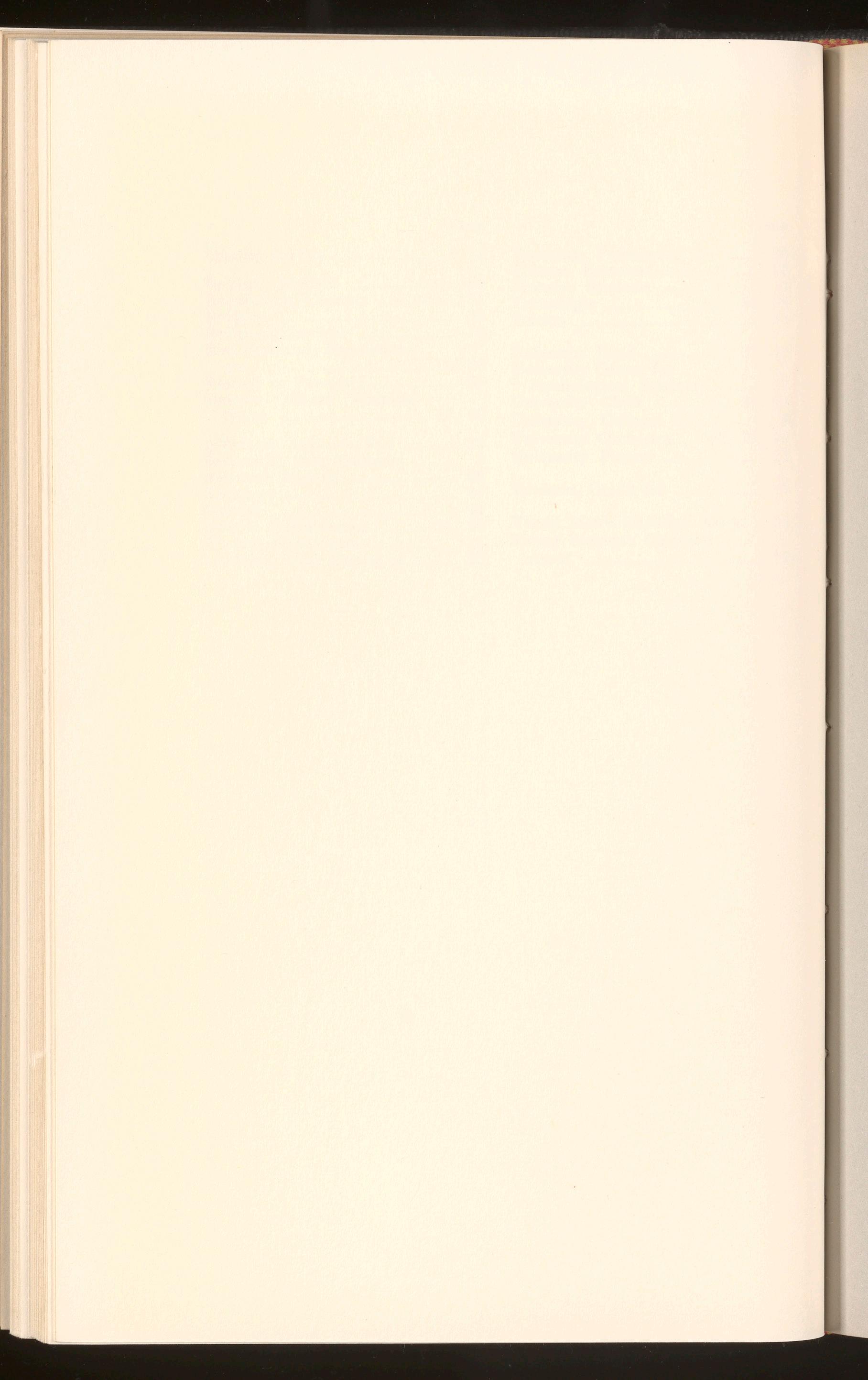Univrrsityoflllichmon~ BULLETIN
Junior College
CATALOGUE NUMBER FOR 1965
With Announcements for Session 1965-1966
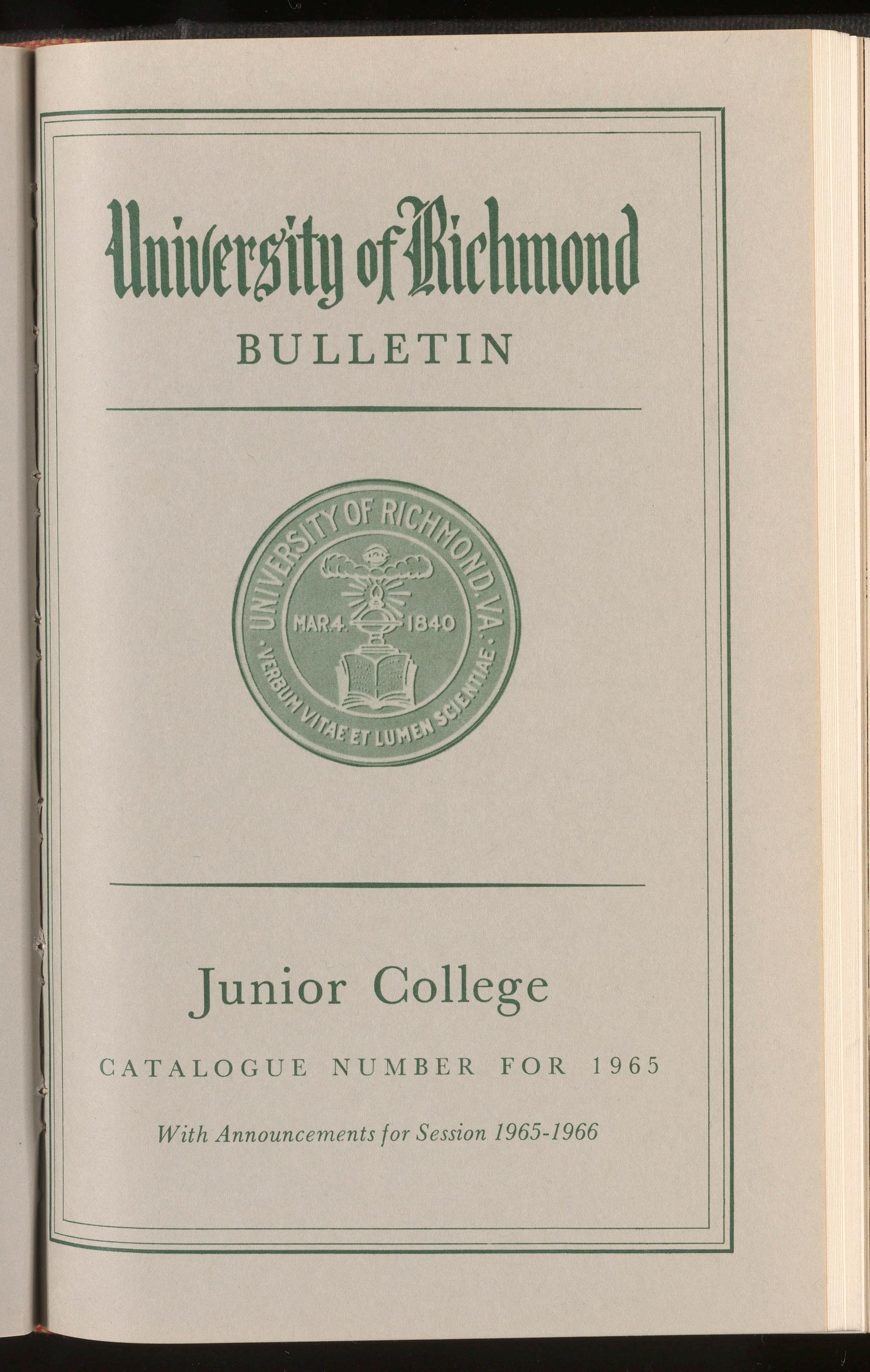

CATALOGUE NUMBER FOR 1965
With Announcements for Session 1965-1966

VOLUME LXVII January, 1965

NUMBER4
Entered as Second Class Matter at the Post Office at the University of Richmond, Virginia 23173, under the Act of Congress August 24, 1912.
Published by the University of Richmond nine times a year: Once in January, three times in March, twice in April, once in May, once in August, and once in December.

Classes-Columbia and Lombardy Buildings, Lombardy Street between Grace and Broad Streets Phone 358-8401 FOR INFORMATION, ADDRESS
MARTIN L. SHOTZBERGER, Dean 601 North Lombardy Street Richmond, Virginia 23220

RICHMOND COLLEGE
RoBERT F. SMART, Dean
THE T. C. WILLIAMS SCHOOL OF LAW
WILLIAM T. MusE, Dean
WESTHAMPTON COLLEGE
M ARGUERITE ROBERT S , Dean
SUMMER SCHOOL
EDW ARD F. OVERTON , D ean
GRADUATE SCHOOL
BENJAMIN C. HoLTZCLAW, Dean
SCHOOL OF BUSINESS ADMINISTRATION
W. DAVID ROBBI N S, Dean
UNIVERSITY COLLEGE
MARTIN L SHOTZBER0ER, Dean
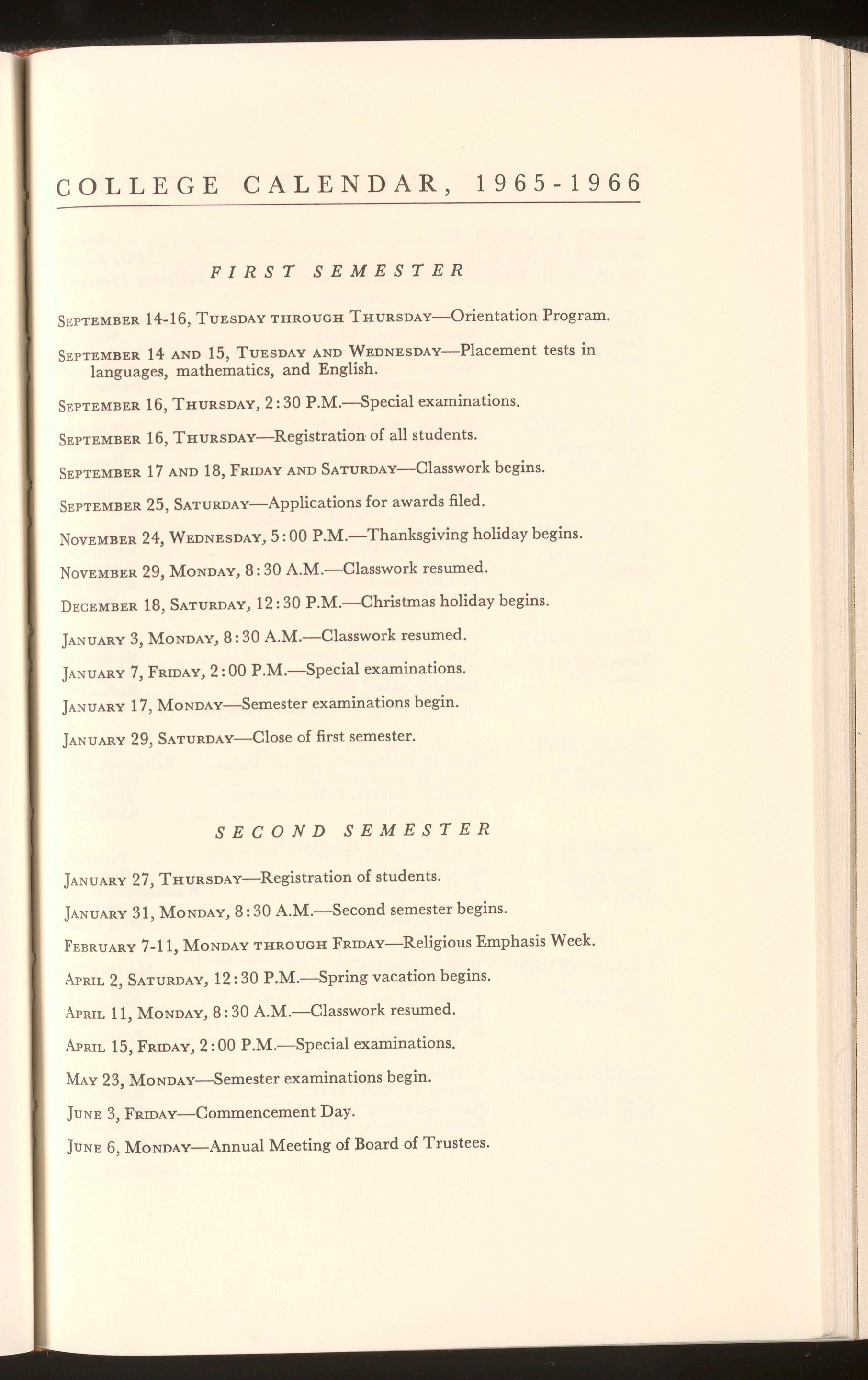
SEPTEMBER14-16, TUESDAY THROUGH THURSDAY-Orientation Program.
SEPTEMBER14 AND 15, TUESDAY AND WEDNESDAY-Placement tests in languages, mathematics, and English.
SEPTEMBER16, THURSDAY, 2: 30 P.M.-Special examinations.
SEPTEMBER16, THURSDAY-Registration of all students.
SEPTEMBER17 AND 18, FRIDAYANDSATURDAY-Classwork begins.
SEPTEMBER25, SATURDAY-Applications for awards filed.
NovEMBER 24, WEDNESDAY,5: 00 P.M.-Thanksgiving holiday begins.
NovEMBER 29, MONDAY, 8:30 A.M.-Classwork resumed.
DECEMBER18, SATURDAY,12: 30 P.M.-Christmas holiday begins.
JANUARY3, MONDAY, 8: 30 A.M.-Classwork resumed.
JANUARY7, FRIDAY,2: 00 P.M.-Special examinations.
JANUARY17, MoNDAY-Semester examinations begin.
JANUARY29, SATURDAY-Close of first semester.
JANUARY27, THURSDAY-Registration of students.
JANUARY31, MoNDAY, 8: 30 A.M.-Second semester begins.
FEBRUARY7-11, MONDAY THROUGH FRIDAY-Religious Emphasis Week.
APRIL2, SATURDAY,12: 30 P.M.-Spring vacation begins.
APRIL 11, MoNDAY, 8: 30 A.M.-Classwork resumed.
APRIL 15, FRIDAY, 2: 00 P.M.-Special examinations.
MAY23, MONDAY-Semester examinations begin.
JUNE 3, FRIDAY-Commencement Day.
JUNE 6, MONDAY-Annual Meeting of Board of Trustees.

ROBERT T. MARSH, JR. ............................................ Rector
W. R. BROADDUS, JR. ......... Vice Rector
CHARLES H. WHEELER III, Ph.D., D.Sc. Secretary-Treasurer
CLASS ONE Term Expires June,1965
CLASS TWO Term Expires June, 1966
CLASS THREE Term Expires June, 1967
CLASS FOUR Term Expires June, 1968
CLASS FIVE Term Expires June, 1969
CLASS SIX Term Expires June, 1970
CLASS SEVEN Term Expires June,1971
CLASS EIGHT Term Expires June, 1972
Robert F. Cav erl ee . D.D. ....Fredericksburg
Garland Gray, LL.D. ..............................Waverly
Mrs. E. B. Willingham ... New York, N Y.
Robert T. Marsh, Jr., LL.D . ................Richmond
R . Clayton Pitts, Ph.D. .. Portsmouth
John W Edmonds, Jr. ................. Accomac
Theodore F. Adams, D.D . ................... .... Richmond
Lynn C. Dickerson, D.D.. .. ........Roanoke
Clyde V. Hickerson, D.D. Richmond
Ross S. Shearer ...................Arlington
Overton D. Dennis, D.Sc J. Vaughan Gary, LL.D.
Elizabeth N. Tompkins
E. Claiborne Robins, LL.D.
Charles H Ryland
E. T. Clark, D.D ..................... ..
Mrs. G . Mallory Freeman
F. D. Gottwald , D.C.S
David J. Mays, LL.D.
John B. Siegel, Jr .
Wm Hugh Bagby .
Wade H. Bryant, D.D ..
M. M Long .Richmond ..............Richmond Richmond Richmond Warsaw Winchester .........Richmond ...........Richmond ....... Richmond .......................Richmond ........................St.Paul .....Baltimore, Md. Richmond ................Hampton
John H. Garber, D.D . Jesse W. Dillon ....................... Richmond
J. L. Camp, Jr , D.Sc.. .. ...................Franklin
E. Turpin Willis ....................Culpeper
E. H. Pruden, D.D .........................................Washington, D C.
W. Tyler Haynes, D .D .S. Richmond
David Nelson Sutton ............West Point
W . R. Broaddus, Jr ... ............................ ... .................Martinsville
.J. B. Woodward, Jr., D.Sc ................................Newport News
James T. Tucker, M.D., D.Sc. ...............Richmond
Joseph A. Leslie, Jr. ........ Norfolk
E. H. Titmus, Jr. Petersbur g
L. Howard Jenkins , D Sc ........
Reuben E. Alley, D.D.
R. S. Reynolds, Jr , D.C.S ..
Ernest L. Honts, D.D.
L. Dudley George ........... Richmond Richmond .Richmond ...................Norfolk ................Richmond

GEORGE MATTHEWS MODLIN, Ph.D , LL.D. PRESIDENT
CHARLES H. WHEELER III, Ph.D., D.Sc. TREASURER
MARTIN L. SHOTZBERGER, Ph.D. DEAN
JAMES A. MONCURE, Ph.D.
ASSOCIATE DEAN OF LIBERAL ARTS
JOSEPHINE NUNNALLY, M.A. IN L.S. ACTING LIBRARIAN
SUZANNE S. TUGGLE, B S.
ASSISTANT LIBRARIAN-UNIVERSITY COLLEGE
JOHN W BRIZENDINE, B.D ., Ph.D.
DIRECTOR OF RELIGIOUS ACTIVITIES
JOSEPH E . NETTLES
DIRECTOR OF PUBLIC RELATIONS
JEFFERSON D. CLARK
SUPERINTENDENT OF BUILDINGS AND GROUNDS PURCHASING AGENT
ADMINISTRATIVE STAFF
Jean H . Proffitt ............................... ............................................Secretary to the Dean
Jeanne 0. Gwathmey ... Secretary to the Associate Dean
Anna C. Clay .... . .. ..................................College Secretary
Gladys Garten ............................ ...................................Evening Secretary

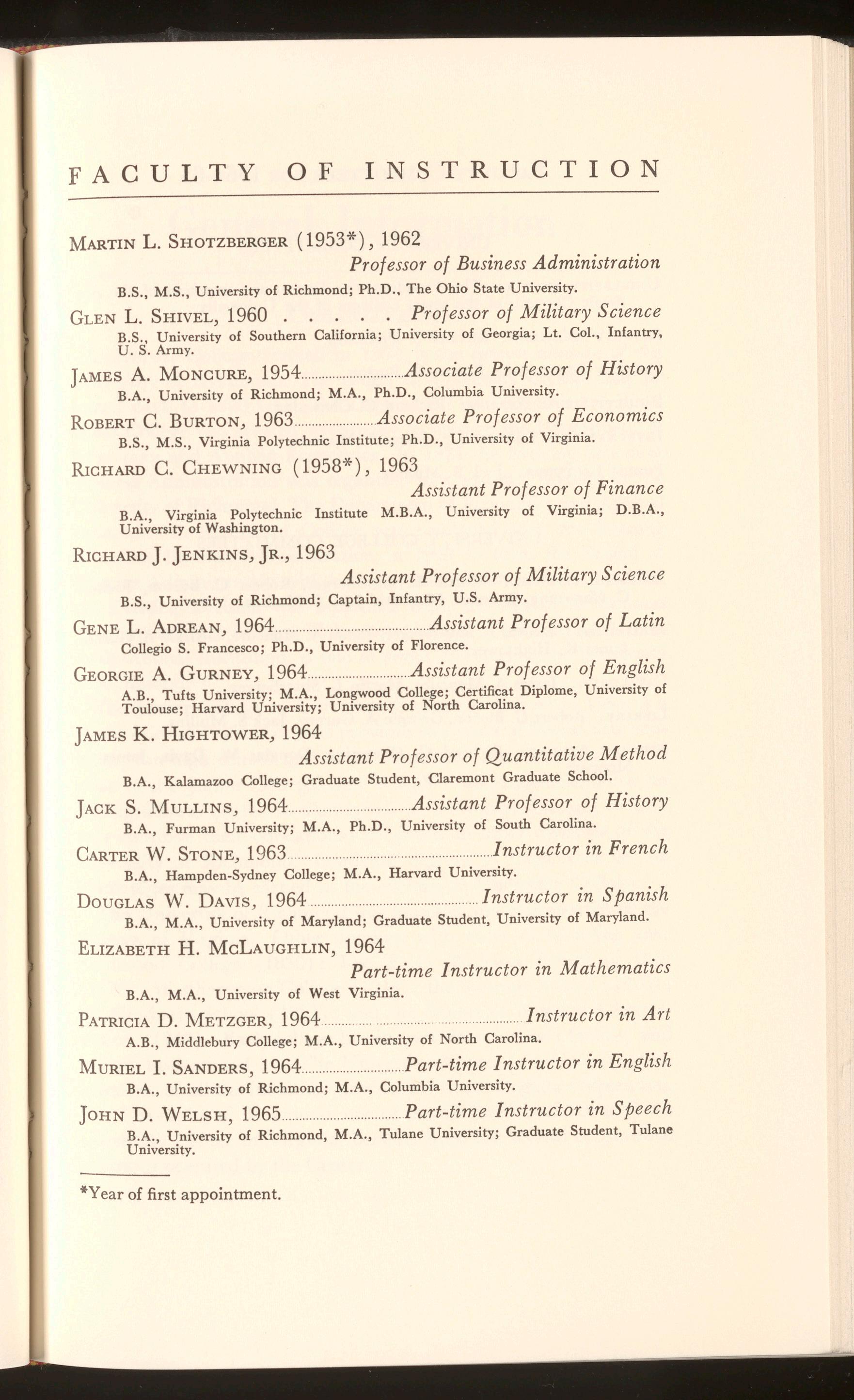
MARTIN L. SHOTZBERGER (1953*), 1962
Professor of Business Administration
B.S., M.S., University of Richmond; Ph.D., The Ohio State University.
GLEN L. SHIVEL, 1960 Professor of Military Science
B S., University of Southern California; University of Georgia; Lt. Col., Infantry, U.S. Army
JAMES A. MONCURE, 1954 .Associate Professor of History
B.A., University of Richmond; M.A., Ph.D., Columbia University.
RoBERT C. BURTON, 1963 .................. ...Associate Professor of Economics
B.S., M.S., Virginia Polytechnic Institute; Ph D., University of Virginia.
RrcHARD C. CHEWNING ( 1958*), 1963
Assistant Professor of Finance
B.A., Virginia Polytechnic Institute M.B.A., University of Virginia; D.B.A., University of Washington.
RICHARD J.JENKINS, JR., 1963
Assistant Professor of Military Science
B S., University of Richmond; Captain, Infantry, U.S. Army .
GENE L. ADREAN, 1964. .... .Assistant Professor of Latin Collegio S. Francesco; Ph.D., University of Florence
G E ORGIE A. GURNEY, 1964 .....Assistant Professor of English
A B., Tufts University; M.A., Longwood College; Certificat Diplome, University of Toulouse; Harvard University; University of North Carolina.
JAMES K. HIGHTOWER, 1964
Assistant Prof essor of Quantitative Method
B.A., Kalamazoo College; Graduate Student, Claremont Graduate School.
J ACK S. MULLINS, 1964... .....Assistant Professor of History
B A., Furman University; M.A., Ph D., University of South Carolina.
CARTER W. STONE, 1963 .....................Instructor in French
B.A., Hampden-Sydney College; M.A., Harvard University .
DO U GLAS W. DA VIS , 1964 ......Instructor in Spanish
B.A , M.A., University of Maryland; Graduate Student, University of Maryland.
ELIZABETH H. McLAUGHLIN, 1964
Part-tim e Instructor in Mathematics
B.A., M.A., University of West Virginia.
P ATRICIA D. METZGER , 1964 . .......... . Instructor in Art
A B., Middlebury College; M .A., University of North Carolina.
MURIEL I. SANDERS, 1964 ...........Part-time Instructor in English
B.A., University of Richmond; M.A., Columbia University.
JOHN D. WELSH, 1965.. ......... Part-time Instructor in Speech
B .A., University of Richmond, M.A., Tulane University; Graduate Student, Tulane University.
*Year of first appointment.

FACULTY COMMITTEES FOR 1964-65
UNIVERSITYSENATE: The President, the Deans, a nd members of the Academic Councils of the seven Colleges of the University.
FACULTYMEETINGS: Richard S. Underhill
FACULTYRESEARCH: Robert C. Burton
FACULTYSocIAL AFFAIRS: Richard C. Chewning
INTERNATIONALEDUCATION : James A. Moncure
PUBLICLECTURES: Jack S. Mullins
ACADEMICCouNCIL : Martin L. Shotzberger , Robert C. Burton, Richard C. Chewning, James A Moncure, Jack S Mullins
ADMISSIONS: Martin L. Shotzberger, James A. Moncure, Georgie A. Gurney , James K. Hightower
CATALOGUE:James A. Moncure, Martin L. Shotzberger
LIBRARY: Robert C. Burton, Georgie A. Gurney, Jack S. Mullins
STUDENT AFFAIRS: Richard C. Chewning, Douglas W. Davis, James A. Moncure

University College, formed in 1962, is the newest division of the University of Richmond. The origin of University College may be traced back to 1920 when the Department of Economics of Richmond College was created, eventually to become the Department of Economics and Applied Economics. In 1924 the Evening School of Business Administration was organized as a separate division of the University of Richmond. The Department of Economics and Applied Economics in Richmond College was combined with the Evening School of Business Administration in 1949 to form the School of Business Administration with both day and evening classes. In 1962 the Evening Division was separated from the School of Business Administration to become University College. University College, a coeducational institution, is one of seven divisions of the University of Richmond.
The Junior College of University College, organized in 1964, is a coeducational day school that provides two years of liberal arts education for high school graduates. Students, after completing two years in the Junior College, may complete all requirements for an undergraduate degree in Commerce in University College, or they may continue their educational programs in other divisions of the University of Richmond. Graduate degrees in Commerce or the Humanities may be earned in the evening in University College.
The University of Richmond was founded and is supported by the Baptists of Virginia. Other divisions with dates of founding are: Richmond College ( 1830); The T. C. Williams School of Law (1870); Westhampton College (1914); the Summer School (1920); the Graduate School ( 1921) ; and the School of Business Administration ( 1949). Each college has its own dean, its own faculty, and its own institutional life. The University Senate, on which sit representatives of all the faculties, provides for intercollegiate cooperation. The University of Richmond, one of the affiliated institutions of the University Center in Virginia, benefits from the several cooperative programs operated by the Center.
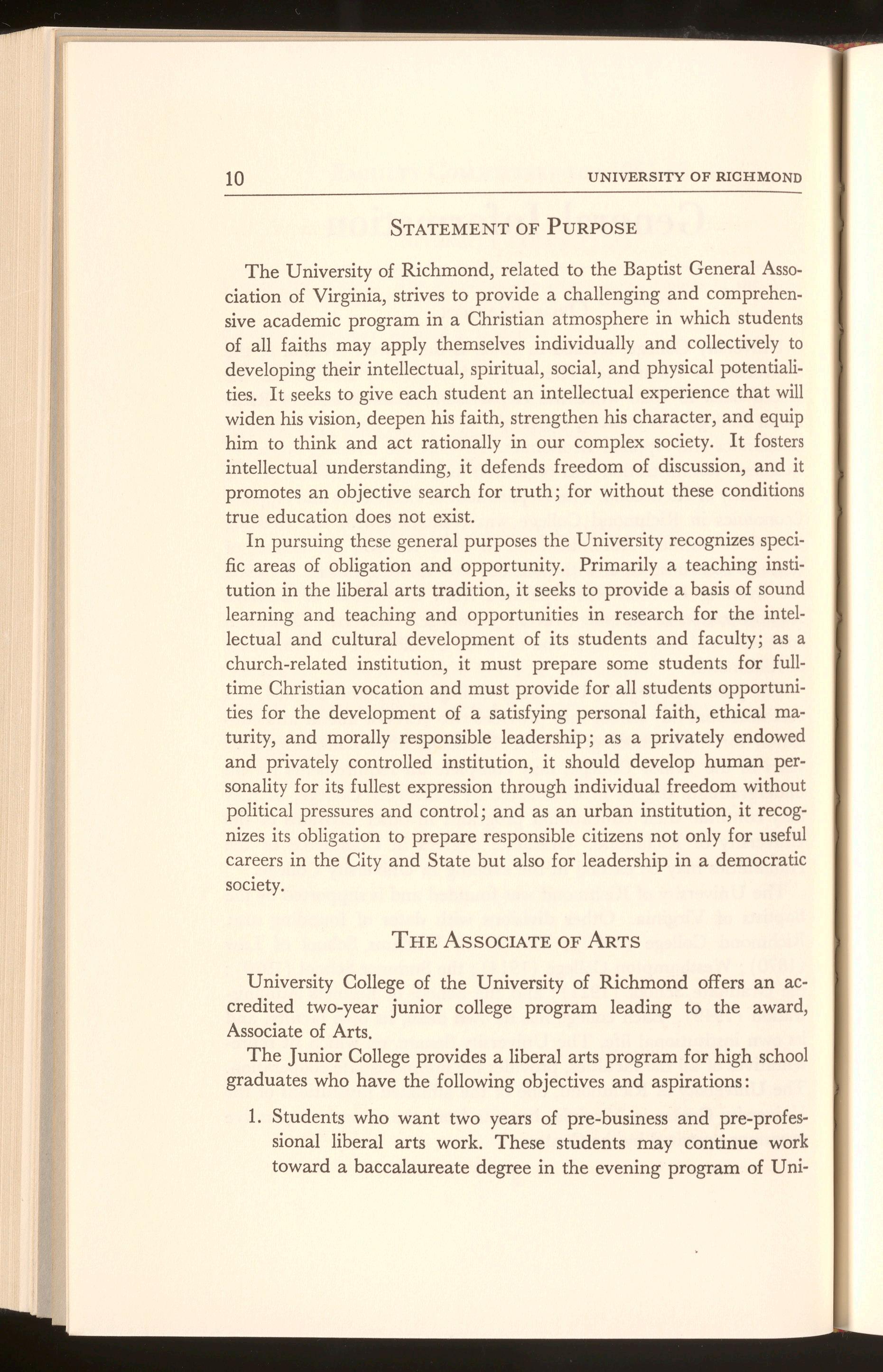
The University of Richmond, related to the Baptist General Association of Virginia, strives to provide a challenging and comprehensive academic program in a Christian atmosphere in which students of all faiths may apply themselves individually and collectively to developing their intellectual, spiritual, social, and physical potentialities. It seeks to give each student an intellectual experience that will widen his vision, deepen his faith, strengthen his character, and equip him to think and act rationally in our complex society. It fosters intellectual understanding, it defends freedom of discussion, and it promotes an objective search for truth; for without these conditions true education does not exist.
In pursuing these general purposes the University recognizes specific areas of obligation and opportunity. Primarily a teaching institution in the liberal arts tradition, it seeks to provide a basis of sound learning and teaching and opportunities in research for the intellectual and cultural development of its students and faculty; as a church-related institution, it must prepare some students for fulltime Christian vocation and must provide for all students opportunities for the development of a satisfying personal faith, ethical maturity, and morally responsible leadership; as a privately endowed and privately controlled institution, it should develop human personality for its fullest expression through individual freedom without political pressures and control; and as an urban institution, it recognizes its obligation to prepare responsible citizens not only for useful careers in the City and State but also for leadership in a democratic society.
University College of the University of Richmond offers an accredited two-year junior college program leading to the award, Associate of Arts.
The Junior College provides a liberal arts program for high school graduates who have the following objectives and aspirations:
1. Students who want two years of pre-business and pre-professional liberal arts work. These students may continue work toward a baccalaureate degree in the evening program of Uni-

versity College, in other divisions of the University of Richmond, or in other senior colleges.
2. Students who prefer a two-year terminal program rather than a full four-year senior college program.
3. Students who are qualified to perform work on the college level but need individual attention, small classes, remedial work, and personal encouragement.
4. Students who want the convenience of college work while living in their homes, and who must save the expense of study away from home.
5. Students who need special guidance in life adjustment and proper vocational direction.
A candidate for the award, Associate of Arts, must file a formal application for the award with the Dean in September of his second year.
The academic requirements for the award are stated in semester hours, one class period per week through a semester being the unit. Quality credits are calculated from academic hours on the following basis: a semester hour passed with grade A shall count three quality credits; with grade B, two quality credits; with grade C, one quality credit; with grade D, no quality credit.
At least thirty semester hours, including the work of the second year, must be completed in University College.
A candidate for the award must complete a minimum of sixty-two semester hours of work with sixty-two quality credits, as follows:
English 101-102, 203-204
Foreign Language 103-104
Mathematics
Laboratory Science
History 107-108
Total required courses
Elective courses
Total Award requirements
See pages 36-37 for suggested programs of study.

To be eligible for the Associate of Arts award, a candidate may take no more than seventy-five semester hours of college work for credit.
The libraries of the University contain over 153,000 volumes. The main collection is housed in the Boatwright Memorial Library. The Junior College has its own Reading Room in Columbia Building. The collections in the Richmond Public Library, Virginia State Library, and the Virginia Historical Society Library afford exceptional facilities for study and research.
Most classes in the Junior College are held in the Columbia and Lombardy Buildings located on Lombardy Street between Grace and Broad Streets.
University College is part of The University of Richmond, which is fully accredited by the Southern Association of Colleges and Schools.
Alumni of the University have long been organized into the General Society of Alumni, which holds annual meetings to renew old associations, maintains a close connection with Alma Mater, and furthers the cause of higher education. The Society engages the services of an alumni secretary and publishes an alumni magazine. Students who have completed a year of study in University College may join the Society.
As a community junior college, no dormitory facilities are provided .

For admission to the Junior College, the general requirements are as follows:
1. The applicant must be at least sixteen years of age.
2. The applicant must present a certificate showing that he is a graduate of an accredited high school, with the grade required by that school for recommendation for college work. Early application is desirable and candidates for admission should file their application with the Associate Dean as soon as possible after beginning their senior year in high school. A processing fee of $10, which is not refundable, must be included with every application for admission.
3. Secondary school work of the applicant must include a minimum of fifteen high school units, distributed as follows: English, 4; mathematics, 3, including 2 in algebra and 1 in geometry;* history, 1; science, 1, preferably biology, chemistry or physics; the remaining units elective from high school graduation requirements, except that not more than four units of vocational work will be accepted, and no credit will be allowed for less than two units in any foreign language. A student who enters college without two units in foreign languages will be required to take in college without degree credit a first-year foreign language to remove this deficiency. Should a student be admitted who is deficient in high school mathematics or English, he will be required to remove such deficiency by taking non-credit high school mathematics or English courses in the University of Richmond or in such other manner as may be approved in advance by the Associate Dean or faculty advisers.
4. All candidates for admission to the freshman class of the Junior College must take the Scholastic Aptitude Test of the College En-
* In lieu of the mathematics units listed abov~ the student may offer the work in college preparatory mathematics recommended by the uommission on Mathematics of the College Entrance Examination Board This work must include topics selected from algebra, geometry (d~monstrative and analytic), trigonometry and possibly elementary calculus, and probability and statistical inference. Courses designed for other purposes (e.g. consumer mathematics, business mathematics, shop mathematics) are not acceptab le.
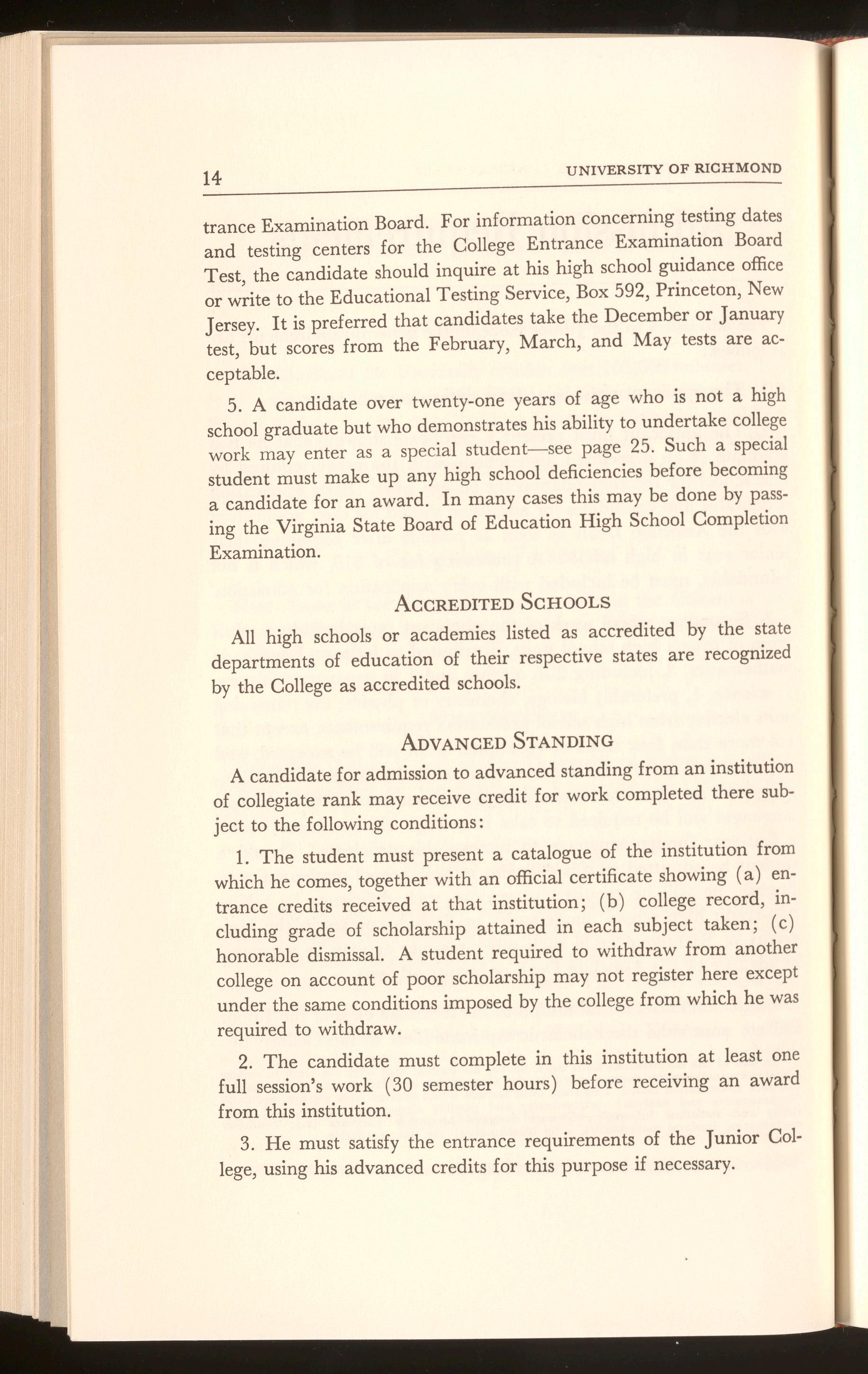
trance Examination Board. For information concerning testing dates and testing centers for the College Entrance Examination Board Test, the candidate should inquire at his high school guidance office or write to the Educational Testing Service, Box 592, Princeton, New Jersey. It is preferred that candidates take the December or January test, but scores from the February, March, and May tests are acceptable.
5. A candidate over twenty-one years of age who is not a high school graduate but who demonstrates his ability to undertake college work may enter as a special student-see page 25. Such a special student must make up any high school deficiencies before becoming a candidate for an award. In many cases this may be done by passing the Virginia State Board of Education High School Completion Examination.
All high schools or academies listed as accredited by the state departments of education of their respective states are recognized by the College as accredited schools.
A candidate for admission to advanced standing from an institution of collegiate rank may receive credit for work completed there subject to the following conditions:
1. The student must present a catalogue of the institution from which he comes, together with an official certificate showing (a) entrance credits received at that institution; (b) college record, including grade of scholarship attained in each subject taken; (c) honorable dismissal. A student required to withdraw from another college on account of poor scholarship may not register here except under the same conditions imposed by the college from which he was required to withdraw.
2. The candidate must complete in this institution at least one full session's work (30 semester hours) before receiving an award from this institution.
3. He must satisfy the entrance requirements of the Junior College, using his advanced credits for this purpose if necessary.

4. Credit is allowed only for work equivalent to courses in the Junior College.
5. The College reserves the right to refuse credit on courses taken in another college in which the student earned a grade below the equivalent of "C" in the University College grading system.
6. Credit for all courses is regarded as provisional at the time of the applicant's admission to college, and will not be considered as final until he has satisfactorily completed at least one session's work in the Junior College.
7. Summer work taken by Junior College students in schools other than the University of Richmond must be approved in advance by the Associate Dean of University College. This written approval must be filed in his office. Courses taken by Junior College students in evening or other schools while they are enrolled here must be approved in advance by the Associate Dean of University College. This written approval must be filed in his office.
In accord with the recommendations of the American Council on Education, the following advanced credit will be allowed veterans:
1. The veteran who has served at least six months, but less than one year, shall receive credit for two hours in military science.
2. The veteran who has served one or more years shall receive credit for four hours in military science.
3. Frequently a veteran may secure additional credit for specialized tr aining courses and for correspondence courses taken from standard colleges under the auspices of the U. S. Armed Forces Institute. A veteran desiring such credit should present his record either on the transcript form of the college in which the work was taken or on the form prepared for such purposes by the U. S. Armed Forces Institute. The Academic Council will determine the amount of credit to be granted in each case.
4. In allowing further advanced credit for educational experience in the armed services the Academic Council will be guided largely by the recommendations of the American Council on Education.
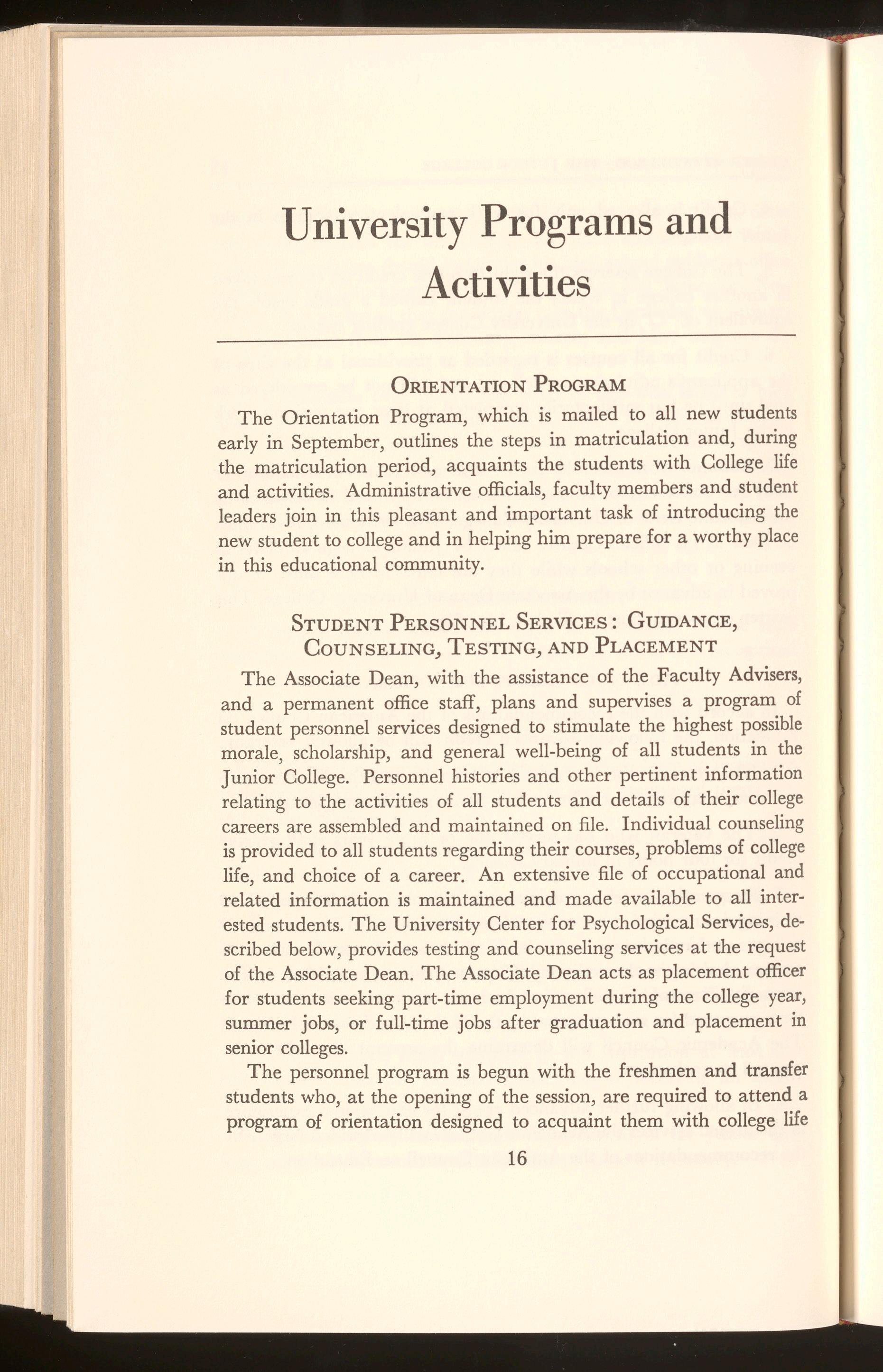
The Orientation Program, which is mailed to all new students early in September, outlines the steps in matriculation and, during the matriculation period, acquaints the students with College life and activities. Administrative officials, faculty members and student leaders join in this pleasant and important task of introducing the new student to college and in helping him prepare for a worthy place in this educational community.
The Associate Dean, with the assistance of the Faculty Advisers, and a permanent office staff, plans and supervises a program of student personnel services designed to stimulate the highest possible morale, scholarship, and general well-being of all students in the Junior College. Personnel histories and other pertinent information relating to the activities of all students and details of their college careers are assembled and maintained on file. Individual counseling is provided to all students regarding their courses, problems of college life, and choice of a career. An extensive file of occupational and related information is maintained and made available to all interested students. The University Center for Psychological Services, described below, provides testing and counseling services at the request of the Associate Dean. The Associate Dean acts as placement officer for students seeking part-time employment during the college year, summer jobs, or full-time jobs after graduation and placement in senior colleges.
The personnel program is begun with the freshmen and transfer students who, at the opening of the session, are required to attend a program of orientation designed to acquaint them with college life

and to prepare them better to become good members of the student community. This Orientation Program begins this year on September 14th.
The work is continued through individual and group conferences conducted by the Associate Dean and through the system of Faculty Advisers for all students and Student Advisers for freshmen. Each adviser has a small group of students with whom he tries to enter into especially friendly relations in order to assist them in their life at college, in their personal problems and in their preparation for a career. Each student should have a conference with his adviser at least once a month. Normally more frequent conferences are advisable.
The Center provides specialized services in vocational testing and counseling, and in personal counseling. These services provide evidence of the student's abilities, interests, and achievements, and assist him in making the most of his opportunities for academic and personal growth. Other activities of the Center include courses in reading improvement and effective study techniques.
The Reserve Officers' Training Corps provides military training at civilian institutions for the purpose of qualifying selected students for appointment as commissioned officers in any one of fifteen branches of the Army. The R.O.T.C. training course is a four-year college program divided into a two-year Basic Course and a two-year Advanced Course. The Junior College provides the student an opportunity to enroll in the Basic Course, and upon graduation the student may take the Advanced Course in Richmond College. The student who enrolls in the Basic Course must complete it as a prerequisite to graduation from the Junior College.
For further information on the Advanced Course, the student should consult the Associate Dean or the Chairman of the Department of Military Science.
The Junior College has an Honor System that requires that a student shall in all the relations of student life act honorably. Breaches

of the Honor Code are cheating, violations of signed pledges, stealing, lying, failure to report violations of the Honor Code and, m general, breaking one's word of honor under any circumstances.
1. The Pledge: "On my honor as a student, I have neither given nor received aid."
2. Meaning of the Pledge: The pledge on quizzes, examinations, written problems, and exercises means that the work which the student hands in to his professor is his own, which he himself has done in accordance with the requirements laid down by the faculty in the regulations set forth below.
3. Exercise Care: It is also important that everyone should exercise the greatest care to keep himself free from suspicion of evil. Such practices as leaving the examination room for any length of time unaccompanied or too frequently, or taking an examination alone, or bringing texts and note books into the examination room, or carelessly glancing toward another student's paper-these are discouraged by the Honor Council. While they do not of themselves constitute infringements of the Honor Code, such practices are dangerous for both the individual and the continued well-being of the Honor System.
All students should take every opportunity to acquaint themselves in detail with the working of the Honor System as well as with these general principles.
The Honor System is a principle of conduct and not a set of rules for conduct. It should be understood that the following statement is intended only to cover the chief and most easily misunderstood applications of that principle, and not to serve as a substitute for it.
I. No test, examination, theme, term paper, or parallel reading report will be accepted which does not have the customary pledge written out in full and signed.
II. The placing of the pledge on a test or examination paper means that the s~udent has. used no books, notes, or other aids except by explicit permiss10n of the mstructor.
A. When a book is used by permission of the instructor it must be free from annotations in that part of the book used. '

B. When an oral test is given, no books or notes are to be used except by explicit permission of the instructor.
Ill. The placing of the pledge on a term paper or theme means that the work is the student's own and contains no plagiarism-that is, theft from another writer. There are two kinds of plagiarism: copying the ideas or facts belonging to another; and copying his words.
A. To avoid the first kind, it is necessary, whenever the student consults any reference work or other source, that he give in the body of his paper or in a footnote the name of the reference work or author.
B. To avoid the second, it is necessary, whenever the student uses the words of another, that he enclose them in quotation marks and give in his paper or in a footnote the name of the author.
C. Plagiarism is not avoided by using the words of another with a few alterations.
D. In general, it is not undesirable for students to co-operate or to help one another in the preparation of their themes, or even in the shaping of the material for their themes. It must be clearly understood, however, that the actual papers must be written without aid.
IV. The placing of the pledge on a parallel reading test or report means that the student has actually read the book or number of pages claimed.
On all unpledged work it is understood that the student's signing the paper with his name means that he has observed the following principles:
I. A student may work and discuss his home work with other students, but may not turn in, as his own, work which he has merely copied from another and to which he has not substantially contributed.
II. A student must make laboratory reports only on work which he has actually done in the laboratory and on results actually obtained there
The services and activities of the many churches in Richmond and vicinity are readily accessible to all students. On each Thursday evening, there is a University vesper service, followed by meetings of the various religious organizations. Religious Emphasis Week, in February, is designed to strengthen the spiritual life of the University. The Director of Religious Activities guides and coordinates the various phases of the College religious life.
Students and faculty attend Junior College assemblies from 11 : 30 to 12: 20 on the second Tuesday for freshmen and the fourth Tues-

day for sophomores. Junior College convocations are held on those Thursdays designated at the beginning of the semester. From time to time, prominent visiting speakers address the convocations on educational, civic and religious themes. The assemblies give opportunity for announcements of interest and importance to the students and for presentation of student affairs. (See paragraph 14 p. 29.)
The Thomas Lectures are provided by "The Thomas Museum Lecture Endowment" donated in 1885 by his family in memory of a former President of the Corporation, James Thomas, Jr. They are delivered annually by authorities on science, philosophy, art, or literature and are open to the public without charge.
The Frederic !William Boatwright Fine Arts Lecture Fund was established in 1955 to bring to the campus as resident scholars eminent authorities in the areas of art, literature, music, or allied fields.
The President of the University has general oversight and control of athletics and is authorized to forbid any features in these exercises which endanger the health or morals of the participants.
The University holds membership in the Southern Athletic Conference and the National Collegiate Athletic Association, and all intercollegiate sports are subject to the rules and regulations of these organizations. A committee of the faculty has charge of the enforcement of these regulations.
The University of Richmond Athletic Council is composed of three members of the Board of Trustees, five members of the faculty, three members of the General Alumni Society, and one member of the student body. This organization serves in an advisory capacity to the President in the control of intercollegiate athletics.

The Student Government Association of the Junior College of University College represents and furthers the best interests of the student body and of the College in general, and brings about cooperation and efficiency among the various student organizations. It is vitally concerned with maintaining the Honor System in the institution. Cordial cooperation exists between the Student Government Association and the constituted College authorities. Every matriculate of the Junior College is a member of this organization. Students of the Junior College who are in good academic standing may participate in the following College and University programs and activities. Students required to pursue as many as six semesterhours of non-credit work and students on probation are ineligible to participate in these programs and activities.
The Messenger-This is a magazine devoted to the development of literary activity among all the students of the University. In this periodical are published short stories, poems, essays, and book reviews.
The Richmond Collegian-This is a weekly newspaper in which are published up-to-date news articles on every phase of University life.
The Web-This is an annual volume issued usually in May or June, abundantly illustrated and forming a transcript of a year of University life.
The student publications of the University are controlled by the administration and the students jointly through an incorporated board, whose legal title is "University of Richmond Publications, Incorporated."

The University Band, composed entirely of students, adds much to the spirit of the campus. It plays for athletic contests and other student functions and participates in community activities. Prospective students who are interested in this organization are invited to bring their instruments. The University owns some of the larger instruments .
The University Choir is a concert organization composed of men and women from all divisions of the University.
The University Orchestra is a concert ensemble open to men and women from all divisions of the University.
The Men's Glee Club offers opportunity to learn to read music at sight, and the experience gained enables many of the members to lead other groups in singing. The Glee Club gives frequent concerts throughout the State.
The R.O.T.C. Military Band is composed of students enrolled in military science courses. It plays at all formations of the Cadet Corps. Some instruments are provided.
The University Players, the University dramatic organization, works in conjunction with the Department of Dramatic Arts. The Speech Arts Building on the main campus and the Luther H. Jenkins Greek Theater are used for various types of production.
An active Young Men's Christian Association is maintained in the University. Its objective is to promote the spiritual and moral welfare of the students. Meetings, addressed by students, faculty members, and prominent men from Richmond, are held weekly.
The Y.W.C .A., with membership open to all women students , seeks to enrich the religious life of the institution through a program of study, worship, and action in many areas of the Christian faith. The organization is affiliated with the national student movement.
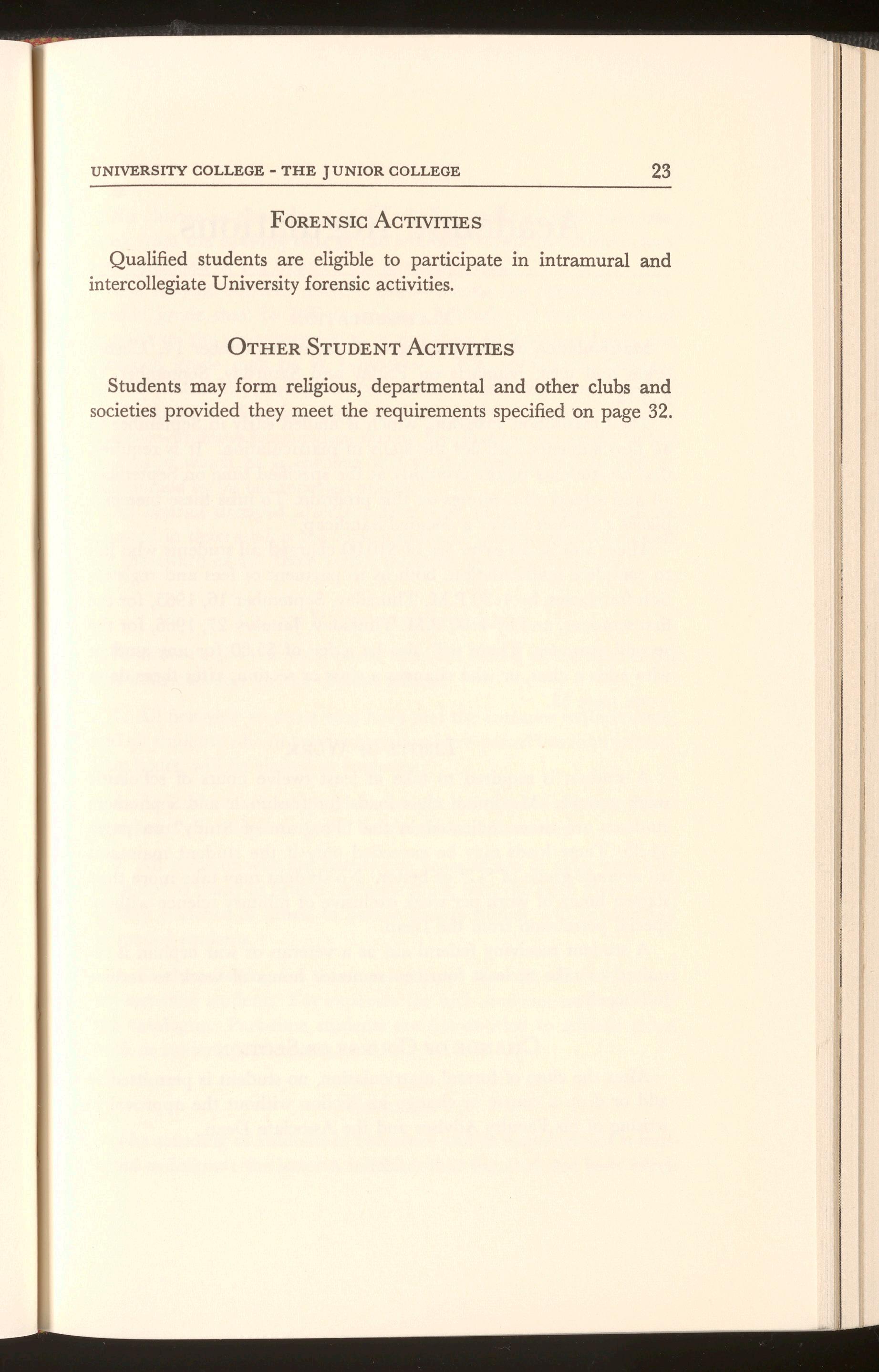
Qualified students are eligible to participate in intramural and int ercollegiate University forensic activities.
Students may form religious, departmental and other clubs and societies provided they meet the requirements specified on page 32.
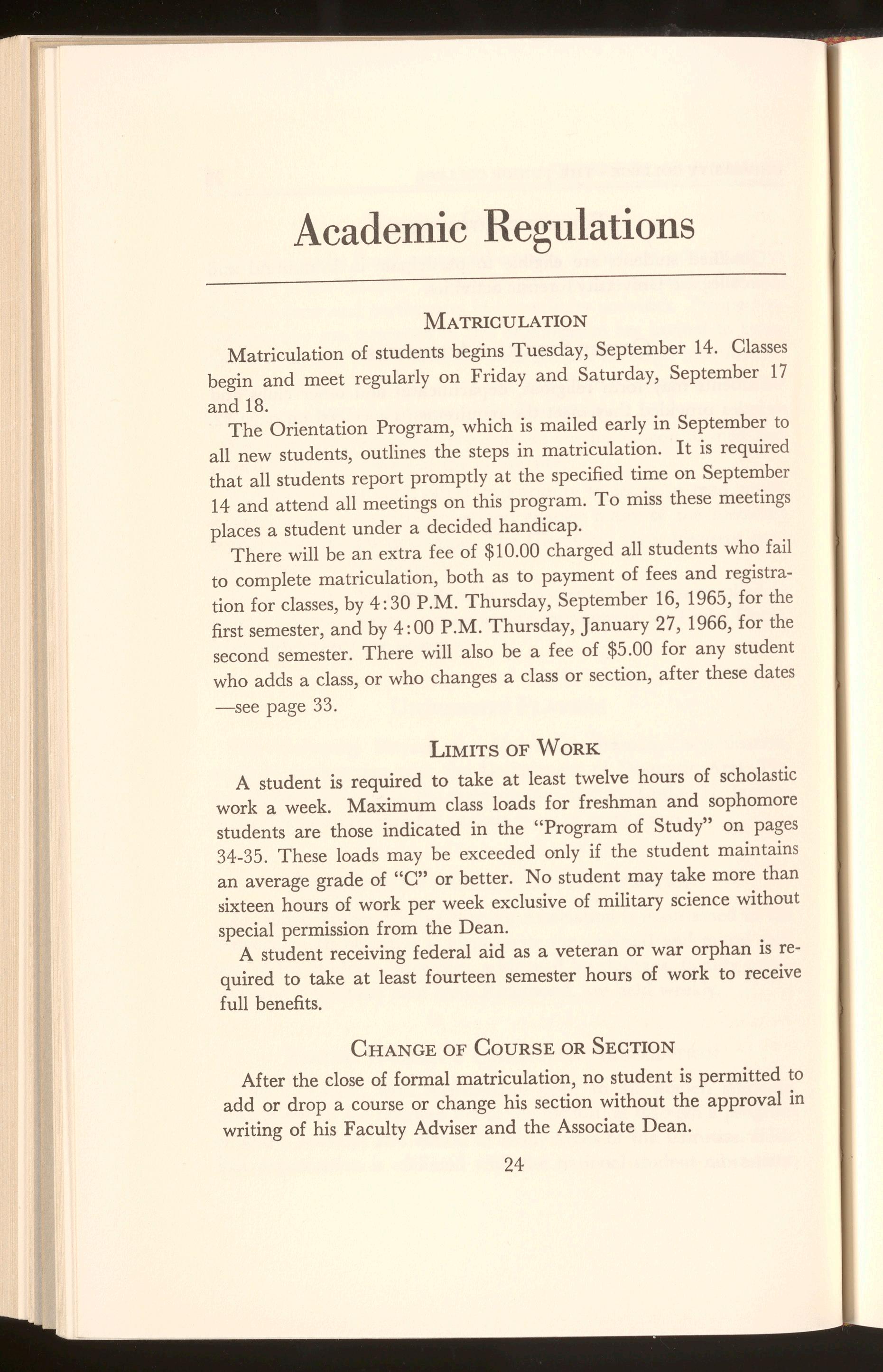
Matriculation of students begins Tuesday, September 14. Classes begin and meet regularly on Friday and Saturday, September 17 and 18.
The Orientation Program, which is mailed early in September to all new students, outlines the steps in matriculation. It is required that all students report promptly at the specified time on September 14 and attend all meetings on this program. To miss these meetings places a student under a decided handicap.
There will be an extra fee of $10.00 charged all students who fail to complete matriculation, both as to payment of fees and registration for classes, by 4: 30 P.M. Thursday, September 16, 1965, for the first semester, and by 4:00 P.M. Thursday, January 27, 1966, for the second semester. There will also be a fee of $5.00 for any student who adds a class, or who changes a class or section, after these dates -see page 33.
A student is required to take at least twelve hours of scholastic work a week. Maximum class loads for freshman and sophomore students are those indicated in the "Program of Study" on pages 34-35. These loads may be exceeded only if the student maintains an average grade of "C" or better. No student may take more than sixteen hours of work per week exclusive of military science without special permission from the Dean.
A student receiving federal aid as a veteran or war orphan is required to take at least fourteen semester hours of work to receive full benefits.
After the close of formal matriculation, no student is permitted to add or drop a course or change his section without the approval in writing of his Faculty Adviser and the Associate Dean.
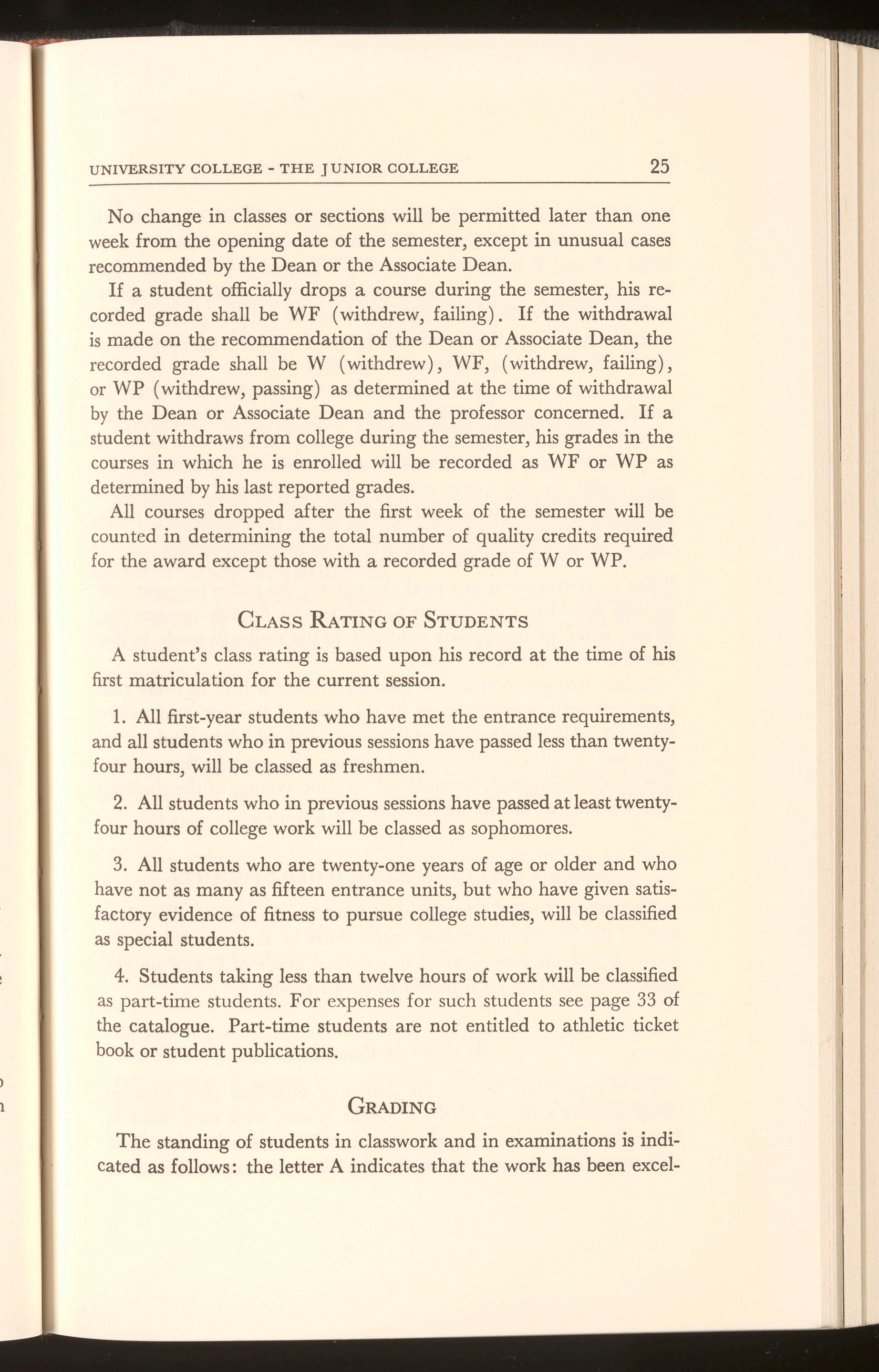
No change in classes or sections will be permitted later than one week from the opening date of the semester, except in unusual cases recommended by the Dean or the Associate Dean.
If a student officially drops a course during the semester, his recorded grade shall be WF (withdrew, failing). If the withdrawal is made on the recommendation of the Dean or Associate Dean, the recorded grade shall be W (withdrew), WF, (withdrew, failing), or WP ( withdrew, passing) as determined at the time of withdrawal by the Dean or Associate Dean and the professor concerned. If a student withdraws from college during the semester, his grades in the courses in which he is enrolled will be recorded as WF or WP as determined by his last reported grades.
All courses dropped after the first week of the semester will be counted in determining the total number of quality credits required for the award except those with a recorded grade of W or WP.
A student's class rating is based upon his record at the time of his first matriculation for the current session.
1. All first-year students who have met the entrance requirements, and all students who in previous sessions have passed less than twentyfour hours, will be classed as freshmen.
2. All students who in previous sessions have passed at least twentyfour hours of college work will be classed as sophomores.
3. All students who are twenty-one years of age or older and who have not as many as fifteen entrance units, but who have given satisfactory evidence of fitness to pursue college studies, will be classified as special students.
4. Students taking less than twelve hours of work will be classified as part-time students. For expenses for such students see page 33 of the catalogue Part-time students are not entitled to athletic ticket book or student publications.
The standing of students in classwork and in examinations is indicated as follows: the letter A indicates that the work has been excel-

lent (95-100%); B, that it has been very good (88-94%); C, that it has been average (80-87%); D, that it has been just passing (7579%); E and F indicate failure; W, WP, and WF indicate withdrawal during the semester ( see page 23) ; and "I" means incomplete. The relation of this grading system to the quality credits which must be earned for the Associate of Arts Award is explained under the heading Associate of Arts on page 10.
Any course failed by a student may be repeated only once. A transfer student who has failed a course at another college may take an equivalent course in the University of Richmond only once. If a second failing grade is earned in any course, the student may receive credit for the course only by passing a special examination. Such special examinations will be given at the time regularly designated in the college calendar for other special examinations.
Students are required to write satisfactory English in all courses When an instructor at any level throughout the entire two-year curriculum considers a student to be deficient in English composition, he may make an appropriate reduction in the student's grade in that course because of this deficiency.
Besides frequent oral and written tests, there is held in every class a general written examination at the close of the first and second semesters. All examinations are limited to three hours, and recitations and lectures are suspended during the examination period. The examination grade is combined with the average of the student's class standing to determine the semester grade.
The Dean's List of Distinguished Students comprises all students who in the preceding semester made thirty or more quality credits and who did not have more than one final grade of C and no final grade below C. This list is published each semester.
Three reports are sent to the parent or guardian each semester. These include a record of the student's grades, with such other information as may be deemed important. Whenever it seems desirable, more frequent reports may be sent. Prompt cooperation on the
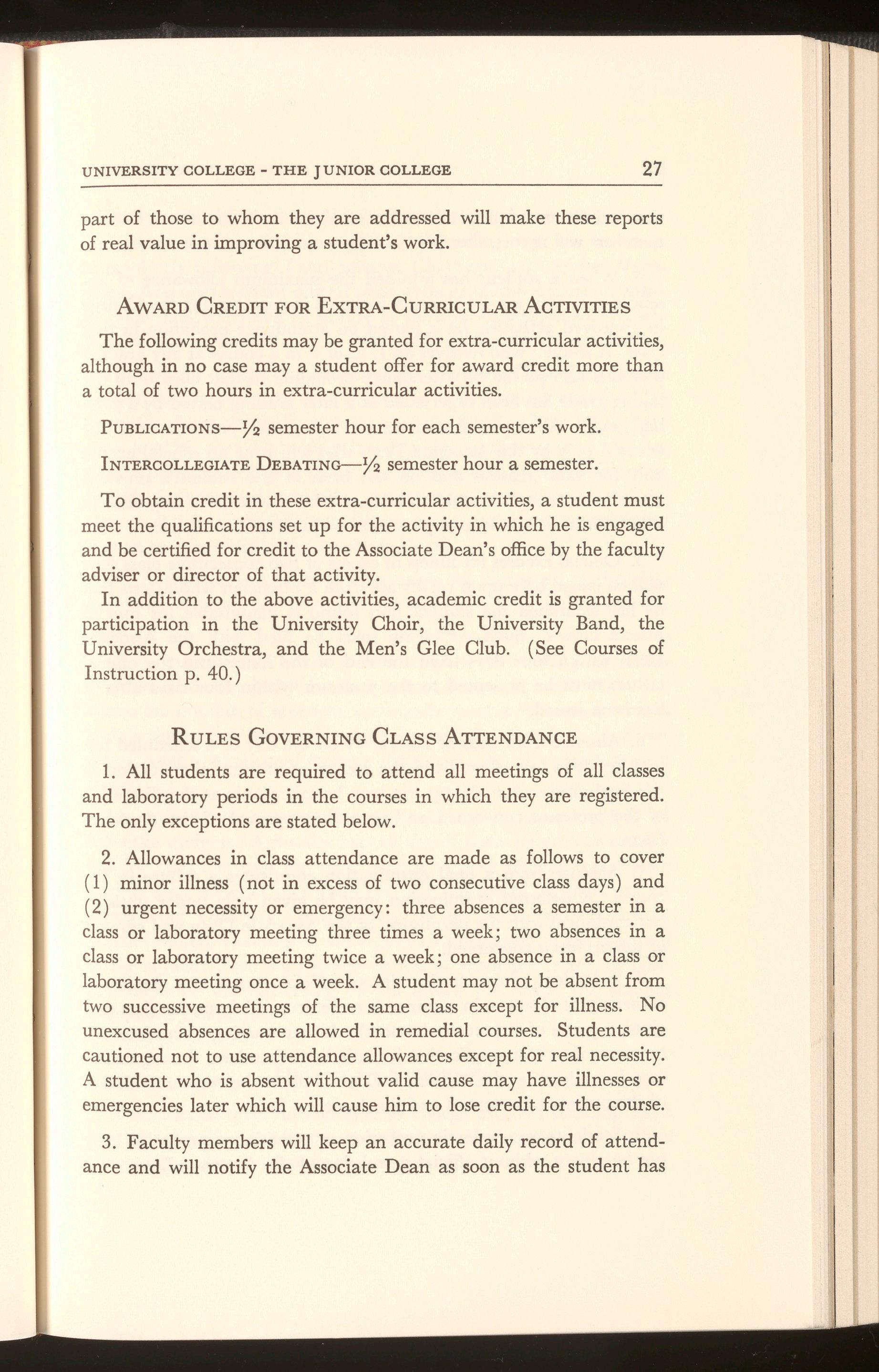
part of those to whom they are addressed will make these reports of real value in improving a student's work.
The following credits may be granted for extra-curricular activities, although in no case may a student offer for award credit more than a total of two hours in extra-curricular activities.
PuBLICATIONs-½ semester hour for each semester's work.
INTERCOLLEGIATEDEBATING-½ semester hour a semester.
To obtain credit in these extra-curricular activities, a student must meet the qualifications set up for the activity in which he is engaged and be certified for credit to the Associate Dean's office by the faculty adviser or director of that activity.
In addition to the above activities, academic credit is granted for participation in the University Choir, the University Band, the University Orchestra, and the Men's Glee Club. (See Courses of Instruction p. 40.)
1. All students are required to attend all meetings of all classes and laboratory periods in the courses in which they are registered. The only exceptions are stated below.
2. Allowances in class attendance are made as follows to cover ( 1) minor illness ( not in excess of two consecutive class days) and (2) urgent necessity or emergency: three absences a semester in a class or laboratory meeting three times a week; two absences in a class or laboratory meeting twice a week; one absence in a class or laboratory meeting once a week. A student may not be absent from two successive meetings of the same class except for illness. No unexcused absences are allowed in remedial courses. Students are cautioned not to use attendance allowances except for real necessity. A student who is absent without valid cause may have illnesses or emergencies later which will cause him to lose credit for the course .
3. Faculty members will keep an accurate daily record of attendance and will notify the Associate Dean as soon as the student has
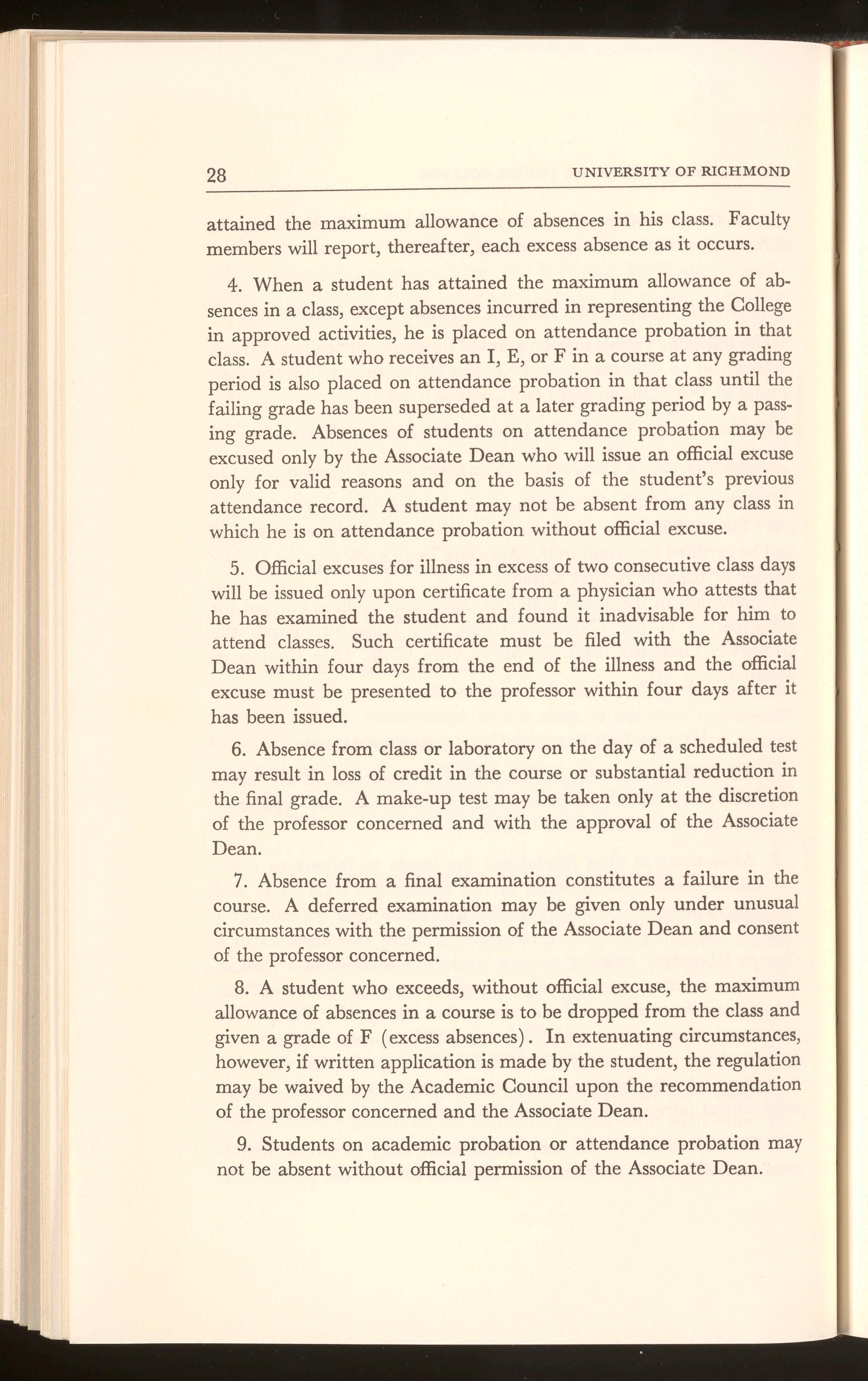
attained the maximum allowance of absences in his class. Faculty members will report, thereafter, each excess absence as it occurs.
4. When a student has attained the maximum allowance of absences in a class, except absences incurred in representing the College in approved activities, he is placed on attendance probation in that class. A student who receives an I, E, or F in a course at any grading period is also placed on attendance probation in that class until the failing grade has been superseded at a later grading period by a passing grade. Absences of students on attendance probation may be excused only by the Associate Dean who will issue an official excuse only for valid reasons and on the basis of the student's previous attendance record. A student may not be absent from any class in which he is on attendance probation without official excuse.
5 . Official excuses for illness in excess of two consecutive class days will be issued only upon certificate from a physician who attests that he has examined the student and found it inadvisable for him to attend classes. Such certificate must be filed with the Associate Dean within four days from the end of the illness and the official excuse must be presented to the professor within four days after it has been issued.
6. Absence from class or laboratory on the day of a scheduled test may result in loss of credit in the course or substantial reduction in the final grade A make-up test may be taken only at the discretion of the professor concerned and with the approval of the Associate Dean.
7. Absence from a final examination constitutes a failure in the course. A deferred examination may be given only under unusual circumstances with the permission of the Associate Dean and consent of the professor concerned.
8. A student who exceeds, without official excuse, the maximum allowance of absences in a course is to be dropped from the class and given a grade of F (excess absences) . In extenuating circumstances, however, if written application is made by the student, the regulation may be waived by the Academic Council upon the recommendation of the professor concerned and the Associate Dean.
9. Students on academic probation or attendance probation may not be absent without official permission of the Associate Dean.
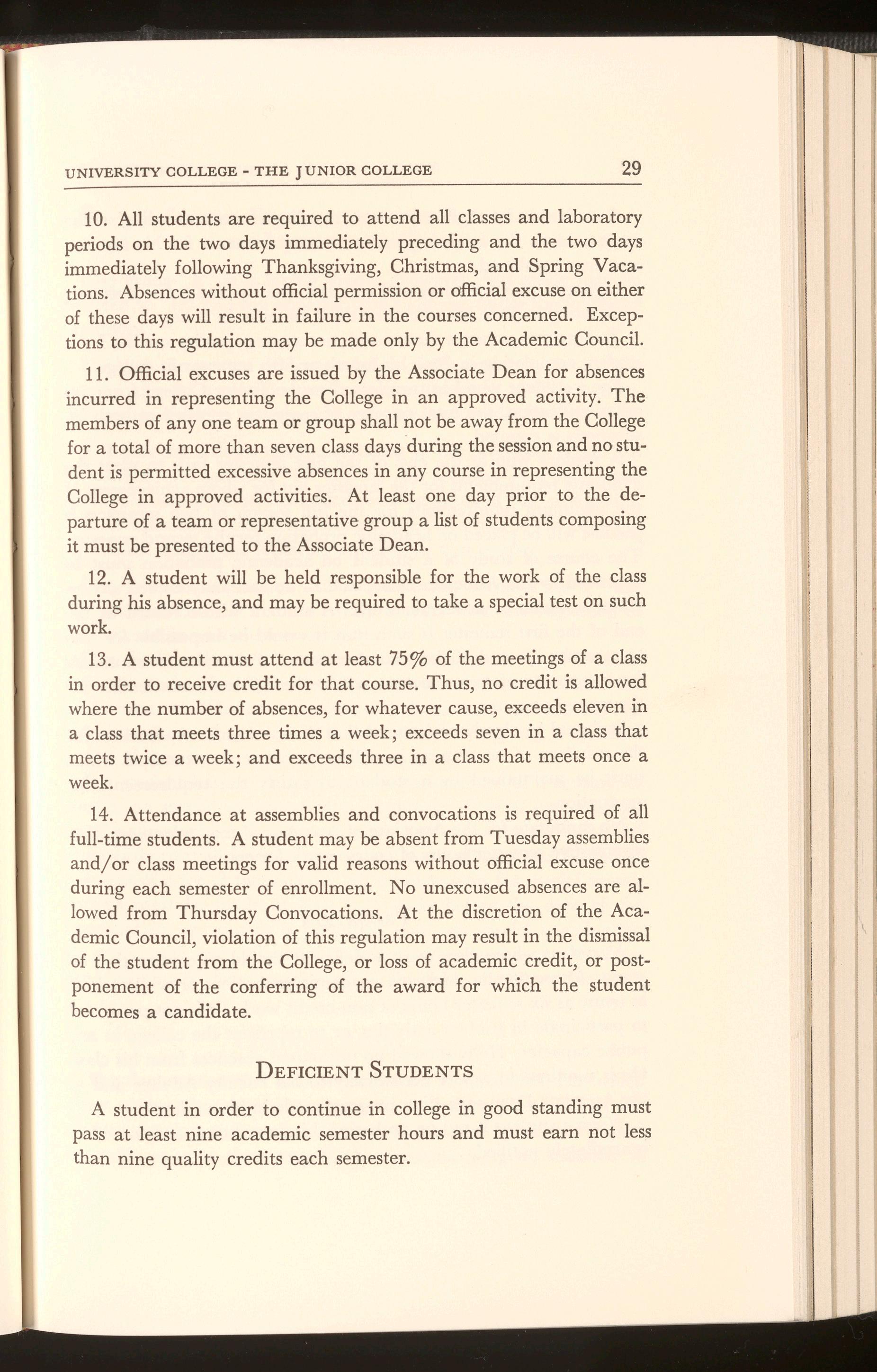
10. All students are required to attend all classes and laboratory periods on the two days immediately preceding and the two days immediately following Thanksgiving, Christmas, and Spring Vacations. Absences without official permission or official excuse on either of these days will result in failure in the courses concerned. Exceptions to this regulation may be made only by the Academic Council.
11. Official excuses are issued by the Associate Dean for absences incurred in representing the College in an approved activity. The members of any one team or group shall not be away from the College for a total of more than seven class days during the session and no student is permitted excessive absences in any course in representing the College in approved activities. At least one day prior to the departure of a team or representative group a list of students composing it must be presented to the Associate Dean.
12. A student will be held responsible for the work of the class during his absence, and may be required to take a special test on such work.
13. A student must attend at least 75% of the meetings of a class in order to receive credit for that course. Thus, no credit is allowed where the number of absences, for whatever cause, exceeds eleven in a class that meets three times a week; exceeds seven in a class that meets twice a week; and exceeds three in a class that meets once a week.
14. Attendance at assemblies and convocations is required of all full-time students. A student may be absent from Tuesday assemblies and/ or class meetings for valid reasons without official excuse once during each semester of enrollment. No unexcused absences are allowed from Thursday Convocations. At the discretion of the Academic Council, violation of this regulation may result in the dismissal of the student from the College, or loss of academic credit, or postponement of the conferring of the award for which the student becomes a candidate.
A student in order to continue in college in good standing must pass at least nine academic semester hours and must earn not less than nine quality credits each semester.
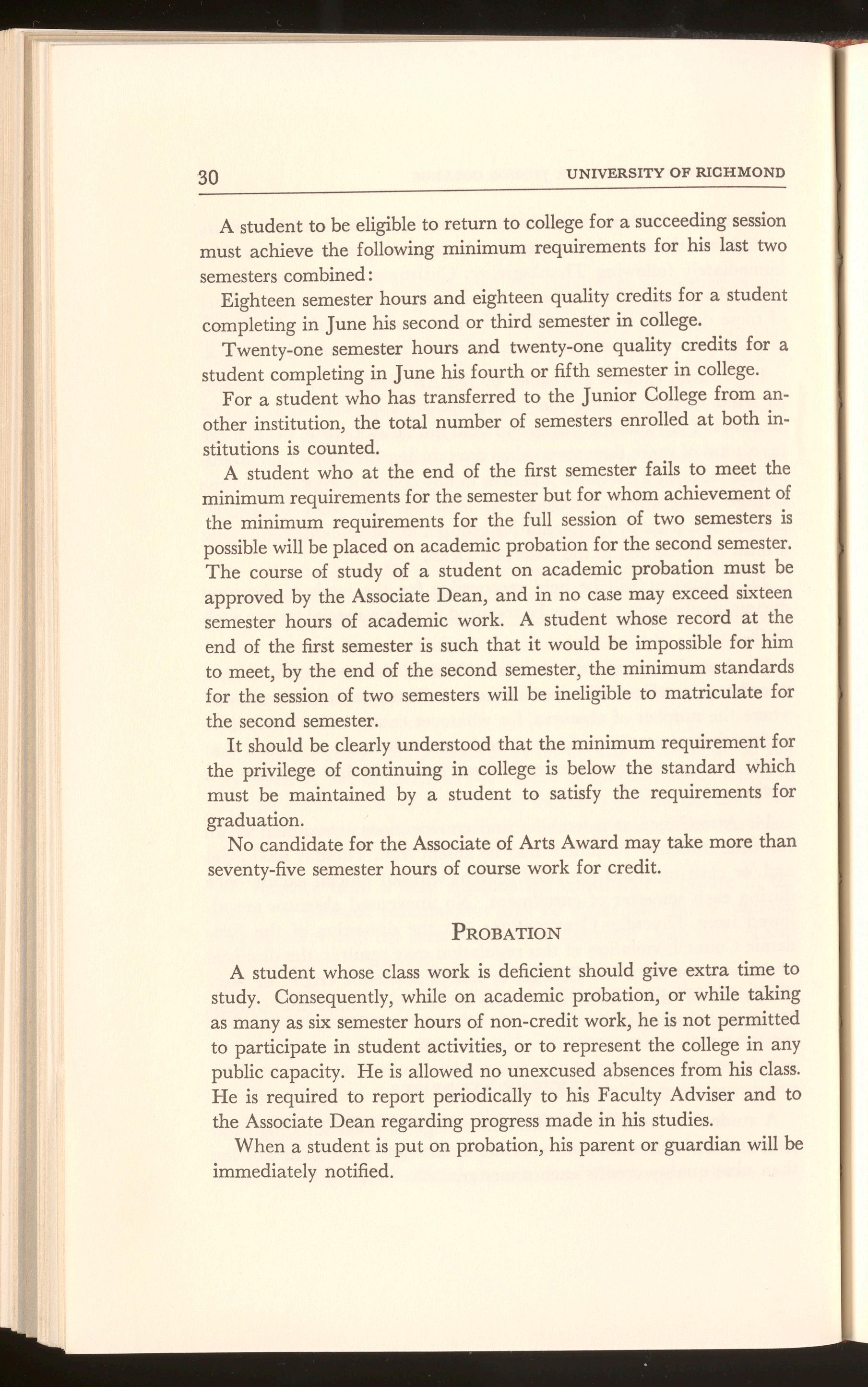
A student to be eligible to return to college for a succeeding session must achieve the following minimum requirements for his last two semesters combined:
Eighteen semester hours and eighteen quality credits for a student completing in June his second or third semester in college.
Twenty-one semester hours and twenty-one quality credits for a student completing in June his fourth or fifth semester in college.
For a student who has transferred to the Junior College from another institution, the total number of semesters enrolled at both institutions is counted.
A student who at the end of the first semester fails to meet the minimum requirements for the semester but for whom achievement of the minimum requirements for the full session of two semesters is possible will be placed on academic probation for the second semester. The course of study of a student on academic probation must be approved by the Associate Dean, and in no case may exceed sixteen semester hours of academic work. A student whose record at the end of the first semester is such that it would be impossible for him to meet, by the end of the second semester, the minimum standards for the session of two semesters will be ineligible to matriculate for the second semester.
It should be clearly understood that the minimum requirement for the privilege of continuing in college is below the standard which must be maintained by a student to satisfy the requirements for graduation.
No candidate for the Associate of Arts Award may take more than seventy-five semester hours of course work for credit.
A student whose class work is deficient should give extra time to study. Consequently, while on academic probation, or while taking as many as six semester hours of non-credit work, he is not permitted to participate in student activities, or to represent the college in any public capacity. He is allowed no unexcused absences from his class. He is required to report periodically to his Faculty Adviser and to the Associate Dean regarding progress made in his studies. When a student is put on probation, his parent or guardian will be immediately notified.

The grade "E" is a failing grade. However, this grade may be changed to "D" and full semester credit allowed under the following conditions:
1. Upon the written recommendation of the professor, the student may be allowed a special examination on the work of the semester, the passing of which will give full semester hour credit for the course.
2. Upon the written recommendation of the professor, credit will be allowed with grade of "D" for the first semester of a continuous course because of subsequent good work ( a grade of "C" or higher) , with or without supplemental work at the discretion of the professor concerned, during the following semester in that course.
The conditional grade of "E" automatically becomes an "F" unless changed to a "D" within twelve months from the beginning of the semester in which it was incurred.
The final grade of "I" shall become a final grade of "F" within two ( 2) weeks after the official close of the semester in which the grade occurred. The only exceptions shall be those approved by the Associate Dean upon request if the instructor is giving a specified period of time for the removal of the grade of "I."
If a student has a failing grade in both semesters of a continuous course, no special examination is permitted . Special examinations may be given only on the dates specified on the College Calendar and upon authorization from the Associate Dean's office, preceded by the payment of a fee of two dollars. All arrangements for special examinations must be made at least two weeks before the date of the examination. A student is permitted only one special examination on any course, and this must be taken within twelve months from the beginning of the semester in which the grade of "E" was incurred.
The deportment of a lady or gentleman is the standard to which every student is expected to conform. All appropriate means are used to develop and confirm a sense of personal honor and regard for truth, as upon these rests the best reliance for good conduct A

few plain and reasonable rules are prescribed, and each matriculate must pledge to obey them.
1. If a student destroys, defaces, or in any way damages Universit y property, or aids and abets others in so doing, he shall within twentyfour hours report the fact to the Dean or the Associate Dean. Students will be charged pro rata for all damages not individually accounted for.
2. No club or society may be formed unless the faculty approves its plan and purpose, the rules by which it proposes to be governed, and the hours of meeting.
3. Living arrangements are subject to examination and approval by the Associate Dean.
In observance of these rules and in all matters not specifically mentioned, the deportment of a lady or gentleman and a student is the standard to which everyone is expected to conform. His sense of honor is the main reliance, and his word in matters touching his own conduct will be called for at the discretion of the Deans or President . In matriculating students, the right is reserved to require the immediate withdrawal from college of any student whenever the administration decides that such action is desirable.
EXPENSESOF THE COLLEGESESSION: Tuition fee
Stud ent Activities fee

.................................. 35.00
T ERMS OF PAYMENT: One half of the expenses is payable on entrance, and the remaining half is payable January 15, 1966.
STUDENTSENTERINGFOR THE SECONDSEMESTERPAYONE HALFOF THE REGULARCHARGES.
The above fees are for full-time students taking from twelve to nineteen hours inclusive per semester. Part-time students taking less th an twelve hours will pay at the rate of $35.00 per semester hour, plu s a laboratory fee of $20.00 for each course in which laboratory work is required. An additional charge of $35.00 will be made for each hour in excess of nineteen carried in an y semester.
SPECIALCHARGES :
R egistr a t ion f ee for non-m a triculated c a ndid a tes for gr a du a tion .....$10 .00
Aw ar d diplom a fe e, p ay abl e nin ety d ay s pre c eding th e d at e of g ra duation, not r efundable
F ee for sp ecial ex a min a tion , e a ch
Fe e for la t e r egistration
F ee fo r ea ch transcript aft er th e first
Fees ar e pa yable in advance by th e semester, remittance being ma de by check drawn to University of Richmond . In order to avoid delay in matriculating, parents and stud ents are urged to pay fees before the opening of the semester.
A student is not fully matriculated for either semester until satisfa ctory arrangements have been made with the Treasurer for the fees for that semester and his full course of study and schedule of 3 3

classes have been finally approved. Students who fail to complete matriculation for the first semester by 4: 30 P.M., Thursday, Septemb er 16, 1965, or 4:00 P.M., Thursday , January 27, 1966, for the second semester, will be charged an extra fee of $10.00.
The College Fee is not subject to deduction or refund. Twentyfive dollars ($25.00) of the College Fee must be paid in advance by new students and by former students not in attendance during the full preceding semester. This advance payment must be made upon acceptance by the College for admission. This payment will be credited on the first-semester account of the student but is not refundable if the student fails to matriculate.
There is a Student Activities Fee of $35.00. The fee, $17.00 for the Athletic Association and $18.00 for the Student Government, admits the student to all games regularly scheduled and played by the University teams on home grounds, and finances various student organizations, activities, and publications. The fee is not refundable.
Students are matriculated for a full term. In case of withdrawal for whatever cause no refund of fees or any part of fees is made.
No Award is granted or credit given for the session's work until all charges have been satisfactorily settled. Failure to make a satisfactory financial arrangement will debar a student from taking final examinations.
Long-term low-interest-bearing student loans are available to second-year students from the E. R. Patterson Educational Foundation. For further information inquire at the office of the Associate Dean.
Virginia students in financial need have the opportunity of applying for aid in the form of grants and loans on liberal terms from the Charles B. Keesee Educational Fund. Application should be made to Mr. W. R. Broaddus, Jr., Martinsville, Va.
Ministers of the Gospel of all denominations, and young men duly approved by their churches as pre-ministerial students, are admitted free of charge of the tuition fee ($200.00). Each such student must furnish the University a letter from his church confirming the
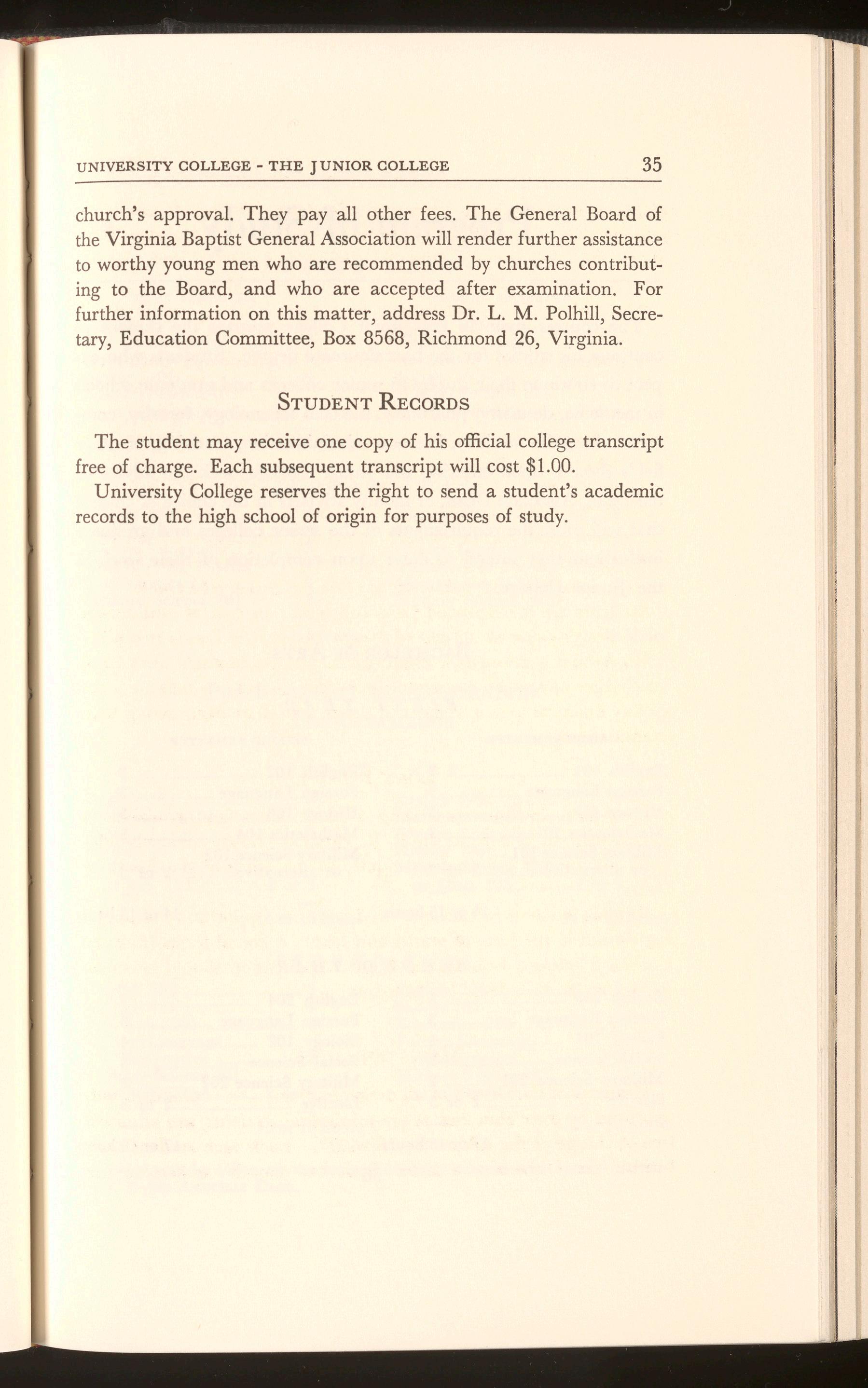
church's approval. They pay all other fees. The General Board of the Virginia Baptist General Association will render further assistance to worthy young men who are recommended by churches contributing to the Board, and who are accepted after examination. For fur ther information on this matter , address Dr. L M. Polhill, Secretary, Education Committee, Box 8568 , Richmond 26, Virginia.
The student may receive one copy of his official college transcript free of charge. Each subsequent transcript will cost $1.00. University College reserves the right to send a student's academic records to the high school of origin for purposes of study.

The courses given m the Junior College prepare the student to continue his studies for the baccalaureate degree. Students who expect to continue their studies in senior colleges and graduate schools in medicine, dentistry, pharmacy, medical technology, forestry, comm erce , law , the ministry, business administration, teaching, or othe r fields should , upon entering the Junior College, seek the advice of the Dean , Associate Dean, or faculty advisers in the choice of courses that will meet the requirements of the senior colleges and graduate institutions they intend to enter upon completion of their work in the Junior College.

sion of the Associate

ALL odd-numbered courses are given during the first semester and even-numbered courses during the second semester unless otherwise indicated. The right is reserved to withdraw any course for which there is insufficient registration. Courses numbered in the one hundreds are intended primarily for freshmen; those in the two hundreds, for sophomores. The numbers in parentheses following course titles indicate the semester hour credit for that course. Where two numbers, separated by a hyphen, follow the title of a full-year course, either half of the course may be taken without the other half.
ACCOUNTING203-204. FUNDAMENTALSOF ACCOUNTING(6)
Basic accounting theory and procedures; adjusting and closing entries; working papers; ledgers; books of original entry; notes and acceptances; controlling accounts, individual proprietorships, partnerships, and corporations; voucher system; balance sheet and income statement accounts; financial statement analysis; manufacturing accounting.
ART 115-116. APPRECIATIONOF ART (2-2)
Introduction to seeing and understanding art forms; painting, architecture, and sculpture. Open to freshmen only.
BIBLE 203. INTRODUCTIONTO THE BIBLE (3)
A study of the general content of the Bible, its unique character, great ideas, historical continuity, relevance, and nature of its books. A study of the origin and translations of the Bible is included.
BIBLE 207. NEW TESTAMENT (3)
A study of the life and teachings of Jesus as presented in the Gospels. BIOLOGY101-102. PRINCIPLESOF BIOLOGY(8)
The fundamental principles of biology and their application to man.
BUSINESS ADMINISTRATION101. INTRODUCTIONTO BUSINESS (3)
A survey course offered for beginning students to give them a perspective of the various phases of business. The student is introduced to such activities as finance, marketing, management, statistics, accounting, labor, transportation, and insurance.
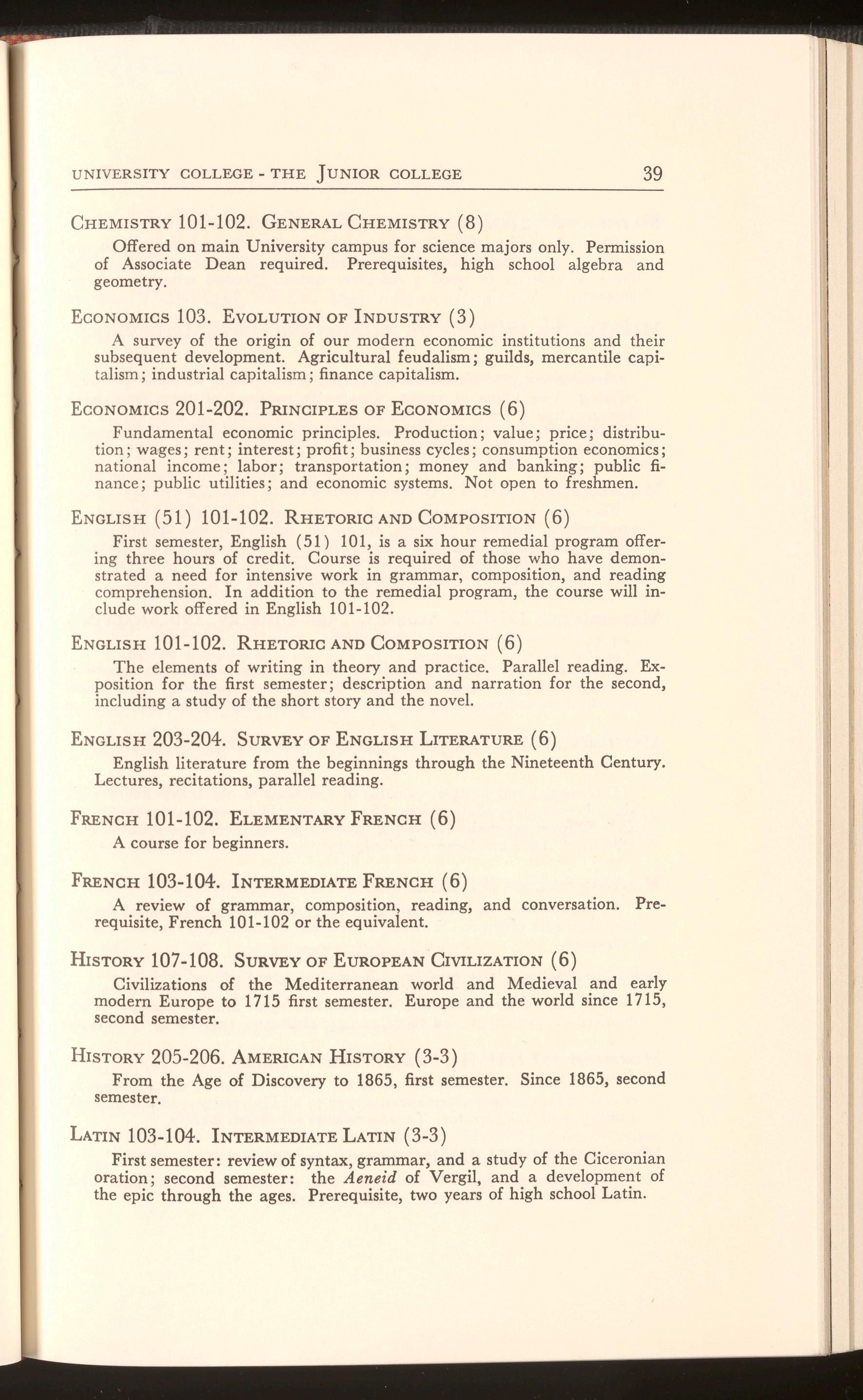
CHEMISTRY 101-102. GENERAL CHEMISTRY (8)
Offered on main University campus for science majors only. Permission of Associate Dean required. Prerequisites, high school algebra and geometry.
ECONOMICS 103. EVOLUTION OF INDUSTRY (3)
A survey of the origin of our modern economic institutions and their subsequent development. Agricultural feudalism; guilds, mercantile capitalism; industrial capitalism; finance capitalism.
ECONOMICS 201-202. PRINCIPLES OF ECONOMICS (6)
Fundamental economic principles. Production; value; price; distribution; wages; rent; interest; profit; business cycles; consumption economics; national income; labor; transportation; money and banking; public finance; public utilities; and economic systems. Not open to freshmen.
ENGLISH (51) 101-102. RHETORIC AND COMPOSITION (6)
First semester, English (51) 101, is a six hour remedial program offering three hours of credit. Course is required of those who have demonstrated a need for intensive work in grammar, composition, and reading comprehension. In addition to the remedial program, the course will include work offered in English 101-102.
ENGLISH 101-102. RHETORIC AND COMPOSITION (6)
The elements of writing in theory and practice. Parallel reading. Exposition for the first semester; description and narration for the second, including a study of the short story and the novel.
ENGLISH 203-204. SURVEY OF ENGLISH LITERATURE (6)
English literature from the beginnings through the Nineteenth Century. Lectures, recitations, parallel reading.
FRENCH 101-102. ELEMENTARY FRENCH (6)
A course for beginners.
FRENCH 103-104. INTERMEDIATE FRENCH (6)
A review of grammar, composition, reading, and conversation. Prerequisite, French 101-102 or the equivalent.
HISTORY 107-108. SURVEY OF EUROPEAN CIVILIZATION (6)
Civilizations of the Mediterranean world and Medieval and early modern Europe to 1715 first semester. Europe and the world since 1715, second semester.
HISTORY 205-206. AMERICAN HISTORY (3-3)
From the Age of Discovery to 1865, first semester. Since 1865, second semester.
LATIN 103-104. INTERMEDIATE LATIN (3-3)
First semester: review of syntax, grammar, and a study of the Ciceronian oration; second semester: the Aeneid of Vergil, and a development of the epic through the ages. Prerequisite, two years of high school Latin.
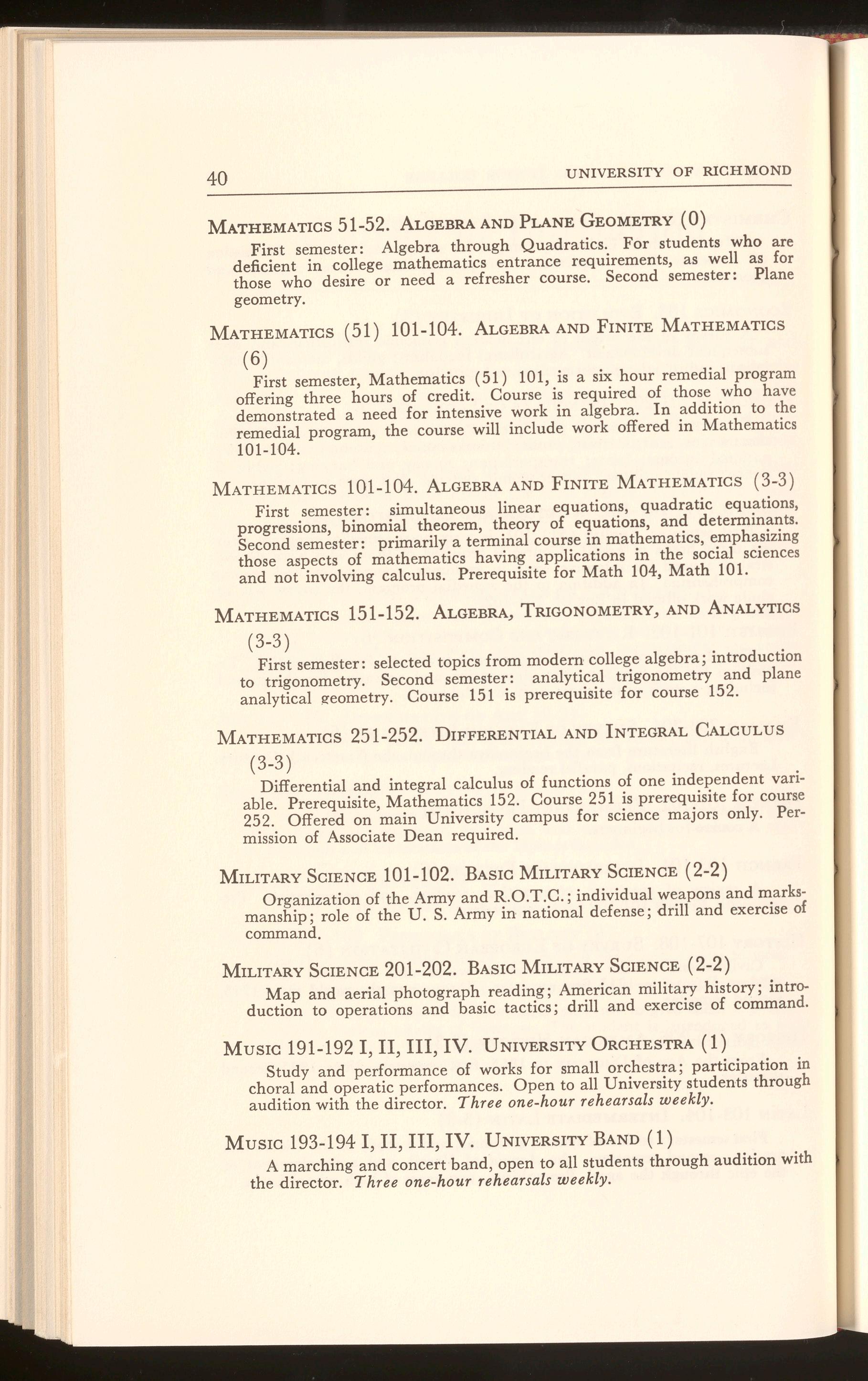
UNIVERSITY OF RICHMOND
MATHEMATICS 51-52. ALGEBRA AND PLANE GEOMETRY (0)
First semester: Algebra through Quadratics. For students who are deficient in college mathematics entrance requirements, as well as for those who desire or need a refresher course. Second semester: Plane geometry.
MATHEMATICS (51) 101-104. ALGEBRA AND FINITE MATHEMATICS (6)
First semester, Mathematics (51) 101, is a six hour remedial program offering three hours of credit. Course is required of those who have demonstrated a need for intensive work in algebra. In addition to the remedial program, the course will include work offered in Mathematics 101-104.
MATHEMATICS 101-104. ALGEBRA AND FINITE MATHEMATICS (3-3)
First semester: simultaneous linear equations, quadratic equations, progressions, binomial theorem, theory of equations, and determinants. Second semester: primarily a terminal course in mathematics, emphasizing those aspects of mathematics having applications in the social sciences and not involving calculus. Prerequisite for Math 104, Math 101.
MATHEMATICS 151-152. ALGEBRA, TRIGONOMETRY, AND ANALYTICS (3-3)
First semester: selected topics from modern college algebra; introduction to trigonometry. Second semester: analytical trigonometry and plane analytical g-eometry. Course 151 is prerequisite for course 152.
MATHEMATICS 251-252. DIFFERENTIAL AND INTEGRAL CALCULUS (3-3)
Differential and integral calculus of functions of one independent variable. Prerequisite, Mathematics 152. Course 251 is prerequisite for course 252. Offered on main University campus for science majors only. Permission of Associate Dean required.
MILITARY SCIENCE 101-102. BASIC MILITARY SCIENCE (2-2)
Organization of the Army and R O.T.C.; individual weapons and marksmanship; role of the U. S. Army in national defense; drill and exercise of command.
MILITARY SCIENCE 201-202. BASIC MILITARY SCIENCE (2-2)
Map and aerial photograph reading; American military history; introduction to operations and basic tactics; drill and exercise of command
Mus1C 191-192 I, II, III, IV. UNIVERSITY ORCHESTRA ( 1)
Study and performance of works for small orchestra; participation in choral and operatic performances. Open to all University students through audition with the director. Three one-hour rehearsals weekly.
Music 193-194 I, II, III, IV. UNIVERSITY BAND ( 1)
A marching and concert band, open to all students through audition with the director. Three one-hour rehearsals weekly.
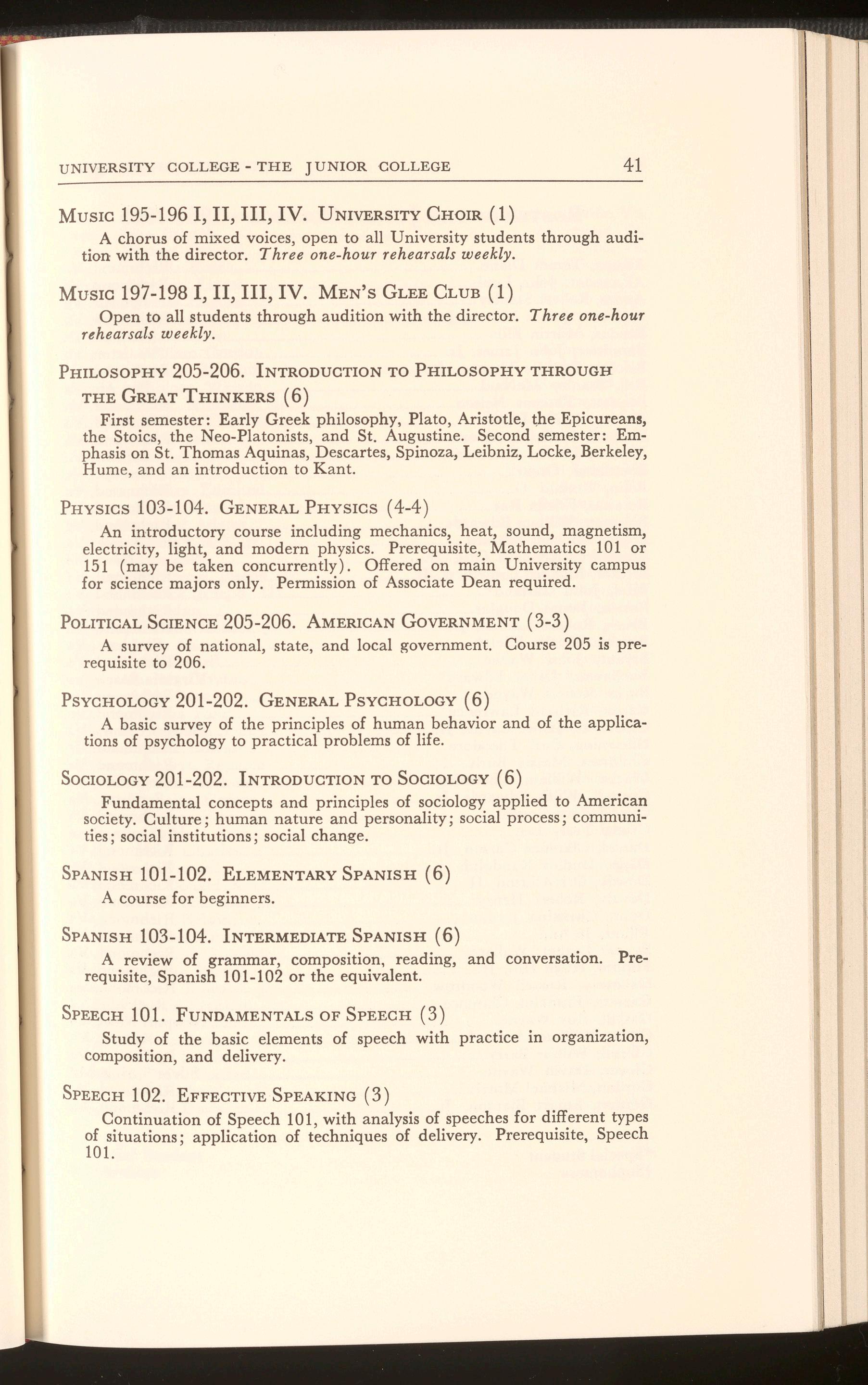
UNIVERSITY
Musrc 195-196 I, II, III, IV. UNIVERSITY CHOIR (1)
A chorus of mixed voices, open to all University students through audition with the director. Three one-hour rehearsals weekly.
Musrc 197-198 I, II, III, IV. MEN's GLEE CLUB (1)
Open to all students through audition with the director. Three one-hour rehearsals weekly.
PHILOSOPHY 205-206. INTRODUCTION TO PHILOSOPHY THROUGH THE GREAT THINKERS (6)
First semester: Early Greek philosophy, Plato, Aristotle, the Epicureans, the Stoics, the Neo-Platonists, and St. Augustine. Second semester: Emphasis on St. Thomas Aquinas, Descartes, Spinoza, Leibniz, Locke, Berkeley, Hume, and an introduction to Kant.
PHYSICS 103-104. GENERAL PHYSICS ( 4-4)
An introductory course including mechanics, heat, sound, magnetism, electricity, light, and modern physics. Prerequisite, Mathematics 101 or 151 (may be taken concurrently). Offered on main University campus for science majors only. Permission of Associate Dean required.
POLITICAL SCIENCE 205-206. AMERICAN GOVERNMENT (3-3)
A survey of national, state, and local government. Course 205 is prerequisite to 206.
PSYCHOLOGY 201-202. GENERAL PSYCHOLOGY (6)
A basic survey of the principles of human behavior and of the applications of psychology to practical problems of life.
SOCIOLOGY 201-202. INTRODUCTION TO SOCIOLOGY (6)
Fundamental concepts and principles of sociology applied to American society. Culture; human nature and personality; social process; communities; social institutions; social change.
SPANISH 101-102. ELEMENTARY SPANISH (6)
A course for beginners.
SPANISH 103-104. INTERMEDIATE SPANISH (6)
A review of grammar, composition, reading, and conversation. Prerequisite, Spanish 101-102 or the equivalent.
SPEECH 101. FUNDAMENTALS OF SPEECH (3)
Study of the basic elements of speech with practice in organization, composition, and delivery.
SPEECH 102. EFFECTIVE SPEAKING (3)
Continuation of Speech 101, with analysis of speeches for different types of situations; application of techniques of delivery. Prerequisite, Speech 101.
RosTER OF THE JUNIOR CoLLEGE-1964-1965
Adams, Teresa Diane .......................................... ..........Richmond, V a.
Alexander, John Louis . ........ .................... Richmond, V a.
Andes, Robert Stanley ....................... .........................Bon Air, Va Andrews, James Milton, Jr. .............................. Richmond, V a Bandas, Martin Ellis Richmond, V a.
Bannister, John James, Jr......... ............. ...........Sa ndston, V a. Belcher, Freddie Thomas, Jr. .......Richmond, V a. Bell, Stanley McNaul. ................................... Bon Air, V a.
Bennett , Thomas Nelson ...............Richmond, V a. Bickley , Philip Dare . ..Richmond, V a. Bischoff, Rudolph Albert. Richmond, V a. Bledsoe, Lucian Sherman . Bon Air, V a.
Boetticher, Oscar ............
Bolin, Ronald G. ............ .........

V a.
Richmond , V a.
Bottoms, Frieda Rae ........................ ..........Richmond , V a .
Bowman , William Edwards ...................Richmond , V a. Bragg , Michael Edward Falls Church , V a. Bransford, Kenneth Otis, Jr. ..... .. Newport N ews, V a.
Bricker , Richard Crowthers, Jr. .......Richmond, V a.
Briel , John Garland* ................. Richmond , V a.
Brown, James Douglas .................. Richmond, V a. Bruce, Robert Samuel, Jr. ................................ .........Richmond , V a.
Bryant, Charles Ellettt .......................... ........ Farnham, V a. Bryant, John Walter . Richmond, V a.
Buchanan, James Edward ....Virginia Beach, V a.
Burks , Robert Wayne .. ............Richmond, V a. Capps, Richard Lawrence Richmond, V a. Chambers, James Layne, Jr.. ................ .... ....Newport News, V a. Chewning, Carl Theodore ..................................Richmond, V a. Childress, Massie Burly ..............Richmond, V a. Clarke , William Chewning Alexandria, V a Cottrell, Willis Edwards, Jr ... ....................Sandston, V a. Cox, Jeffery Roger ............. ....................................Richmond , V a
Crum, Terry Lee . ..................... ....... Highspire , Penn Daniel, Clarence Carson, Jr. ............. Richmond, V a. Diggs, Dudley Randolph ...................Richmond, V a.
Dowdy , Otis Clifton, II ........... .. Richmond , V a.
Dowdy, Robert Henry . Richmond, V a . Dunn, Christina Jordan................... .........Richmond , V a. Elliott, J o An n .........Richmond, V a. Evans , Luther Wallace . Richmond, V a. Flippin, Hugh Hill, Jr. Richmond, Va
Galloway, Russell Woodrow ............Richmond, V a.
Garrett , Franklin Clarence Rockville, V a.
Gaskill, Roy Wayne .................Newport News , V a. Gibbs, William Archer* Kinsale, Va . Gibrall , Wilbur Barry . Richmond, V a
Glover, David Wayne ................................................ Silver Spring, Md .
Gordon, Michael Morris Richmond, V a.
Gordon, Stuart Blanton, Jr ............................ .... .......Richmond, Va.
*Special Student tSophomore
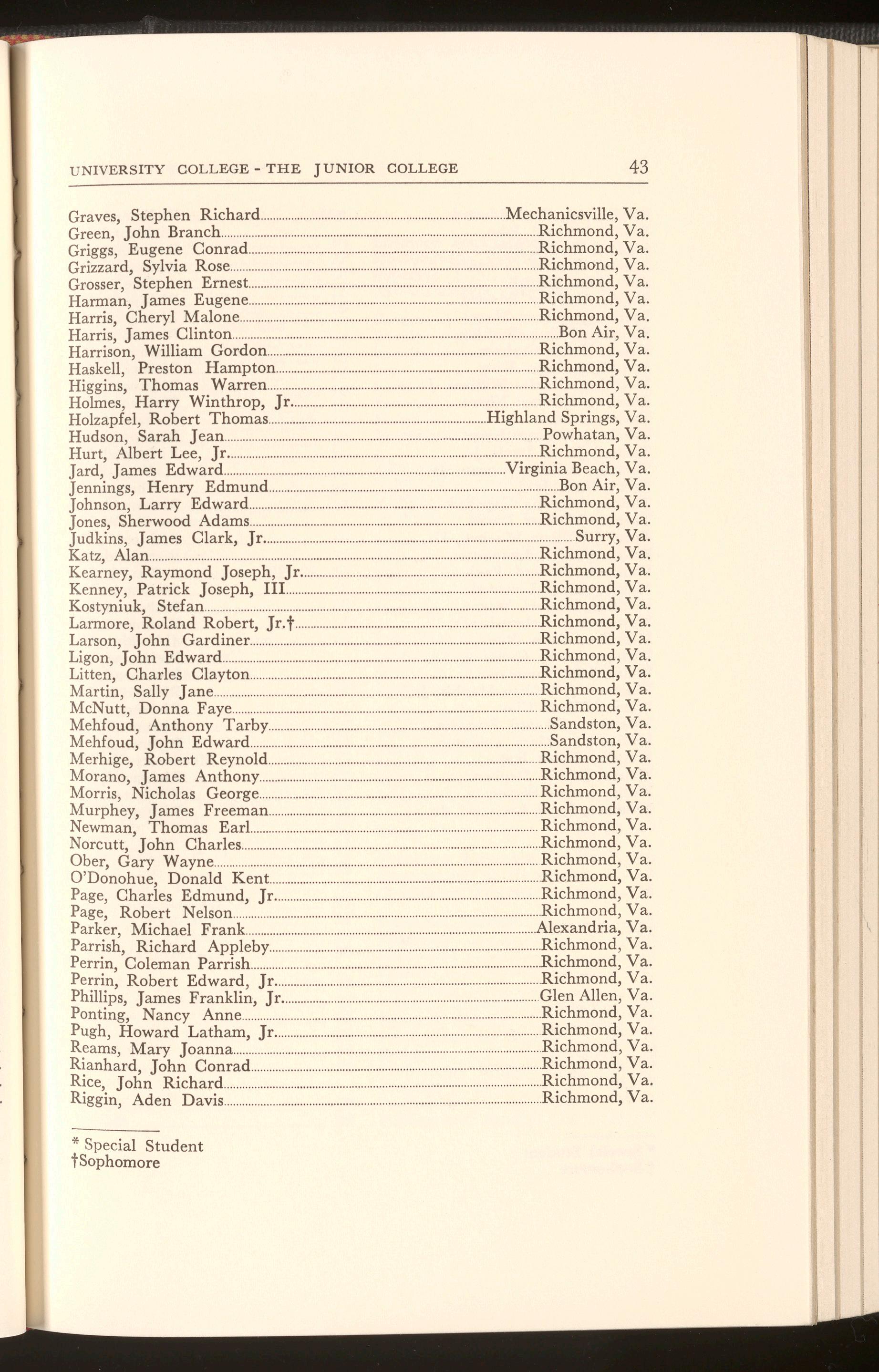
Graves, Stephen Richard Mechanicsville, Va. Green, John Branch ........................................ Richmond, Va. Griggs, Eugene Conrad ...................................................... Richmond, Va Grizzard, Sylvia Rose . .....Richmond , Va Grosser, Stephen Ernest... .... Richmond, Va . Harma n , James Eugene ....................Richmond, Va. Harr is, Cheryl Malone .. Richmond, Va . Harris, James Clinton Bon Air, Va. Harris on , William Gordon ..........................................Richmond, Va. Haske ll, Preston Hampton. ................................... Richmond, Va Higgin s, Thomas Warren .. .................... Richmond, Va. Holmes, Harry Winthrop, Jr. Richmond, Va. Holzap fel, Robert Thomas ...............................Highland Springs, Va. Hudson, Sarah J ea n .............Po wh a tan, Va Hurt, Albert Lee, Jr. Richmond, Va. Jard, James Edward ....Virginia Beach, Va. Jenn ings, Henry Edmund ................. Bon Air, Va. Johnson, Larry Edward Richmond, Va Jones, Sherwood Adams ........ ...Richmond, Va Judkins, James Clark, Jr. ................... ...................Surry, Va. Katz, Alan ... ................. .. Richmond, Va. Kearney , Raymond Joseph , Jr. ........... Richmond, Va . Kenney, Patrick Joseph, III... ...................................... Richmond, Va . Kostyniuk, Stefan .... ............................... .......Richmond, Va.
Larmo re, Roland Robert, Jr.t ................................ Richmond, Va . Larso n , John Gardiner ....................................................... Richmond, Va.
Ligon, John Edward .................................. ..................................Richmond, Va
Litten , Charles Clayton ........................... ..Richmond, Va.
Martin, Sally Jane . ........................... ....Richmond, Va
McN utt , Donna Faye Richmond, Va. Mehfo ud , Anthony Tarby ................. .......................Sandston, Va. Mehfo ud, John Edward ...... Sandston, Va .
Merhige , Robert Reynold ...................... Richmond , Va. Moran o, James Anthony ................Richmond, Va. Morris, Nicholas George .................................. Richmond , Va. Murphey, James Freeman ..................... Richmond, Va. Newma n, Thomas Earl... ................. Richmond , Va.
Norcu tt, John Charles. ........................................................................ .. Richmond, Va. Ober, Gary Wayne ....Richmond , Va. O'Dono hue, Donald Kent... ........................ .Richmond, Va.
Page, Charles Edmund, Jr ..........Richmond , Va
Page, Robert Nelson .................................... Richmo n d , Va . Parker, Michael Frank. .Alexandria, Va. Parrish, Rich ar d Appleby........ ..Richmond , Va
Perrin, Coleman Parrish ..... ................ Richmond, Va
Perrin, Robert Edward , Jr. ..........Richmond, Va
Phillip s, James Fr an klin, Jr .............. Glen Allen, Va. Ponting, Nancy Anne ...................... .Richmond , Va .
Pugh, Howard Latham, Jr. .......................... Richmond, Va .
Reams, Mary Jo a nna ..................... .. Richmond , Va.
Rianhard, John Conrad .. ............Richmond , Va.
Rice, John Richard .......... .......... Richmond, Va.
Riggin, Aden Davis .................. ........Richmond, Va.
* Specia l Student tSop homore
Roth enb erg , P a ul Edw a rd ... ...................................................................Richmond, Va.
Saad y, Mi ch a el John Richmond , Va.
Sa nford, Donna Ruth Richmond , Va.
Scov en , Ch a rles Courtn ey. .. ..............................Richmond , Va.
Sink , John D a ni el. Ch est er , Va.
Smith, Anthony Edward Richmond , Va.
Sp erb erg, Sidney Marc Richmond, Va.
Sprenkl e, Wilson Burnl ey ..........Richmond , Va.
St eger , D en ys Gr a h a m. .....................Richmond , Va .
St ep a n ia n , L eon King Richmond , Va
Stockdon, Ch a rl es William , Jr .... ............................ Ri chmond, Va.
T a r a b ay, Michael Nimer Richmond , Va.
T aylor , C ynthi a. .. ............ Richmond , Va.
T ea ch ey, Willi a m J erry . .............................................................................Richmond, Va.
Tolbert , J am es D a vis, Jr Ri chmond , Va.
To om ey, Robert Norman, Jr......................................... .................................................York , P en n.
Trent, Gale, Jr Chester, Va.
Tu ck er, Virginia C a p ehart Richmond , Va.
Turn er , Mich ae l D a vid Chapmanville, W . Va.
Turn er, William Mitchell, III Richmond, Va
W a lker, Rob ert Livingston Richmond , V a.
Walthall , Edward Paul. Bon Air, Va.
W a lton , Lewis Linwood ..............................................................................................Richmond, V a.
Wa tkins , Lemuel W a yne. Richmond, Va
Westermann, Rob ert Lewis . .................................................. ...........Richmond , Va.
Whitaker, Susan Ray Midlothi a n, V a.
Whitby , David Carter Richmond, V a.
White, John Sherman Richmond, V a.
Whitworth, Willi a m Maphis, Jr Richmond, V a.
Wil ey, William Clay .....................................................................................................Richmond, V a .
Wilkinson , Edward Franklin Richmond, V a.
Willi a mson, Mary L eighton .................................................................................Richmond, V a.
Winters , Ern est Ray ....Mechanicsville, V a.
Woody, Ronald St ephen Richmond, V a.
Willis , Joseph Wayne Powhatan, V a
Yeam a ns, Frank Lynwood, Jr Richmond , V a.

* Special Student t Sophomore



